The Best WordPress Form Plugins
Forms in WordPress are very powerful. From a simple contact form to a survey, newsletter or donation form, almost anything is possible. At least if you use the right plugin for it. That’s why today I’m going to show you the best WordPress form plugins.
WordPress form plugins are extensions that allow WordPress users to create and manage forms on their websites. This can be useful for contact forms, surveys, or signup forms, for example. There are many form plugins for WordPress, each with its features and capabilities.
The best WordPress form plugin
Fluent Forms is the best WordPress form plugin. Voted by BloggerPilot.
From a simple contact form to a complex survey, WordPress form plugins allow you to do almost anything. What exactly each extension can do and where their strengths or weaknesses lie, I’ll show you in today’s comparison of the best WordPress form plugins. Be curious about the results because they will surprise you.
1. WPForms
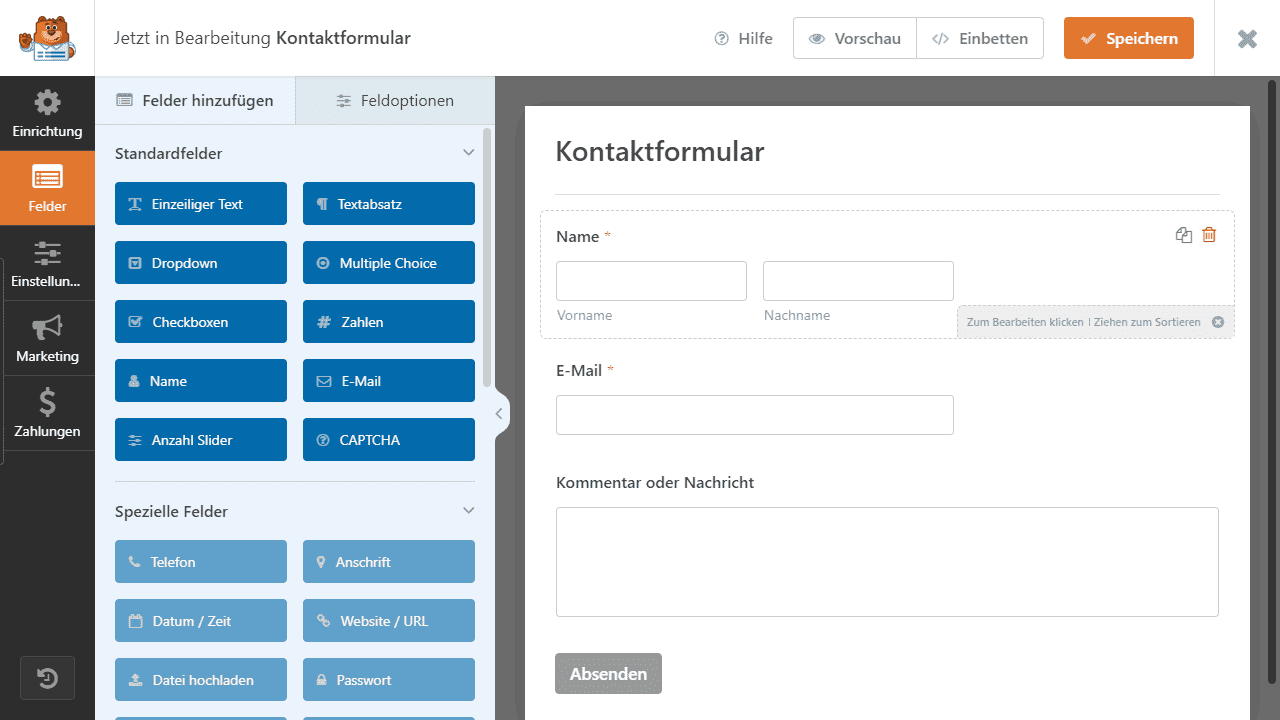
The WPForms plugin describes itself as a drag-and-drop WordPress form builder. So it’s a supposedly simple solution that relies on you easily clicking together the forms you want. Similar to what you know from Page-Builders. This is quite practical, if you consider how easy it is to create different form fields for all kinds of applications.
Of course, all basic features are included, such as the consent with regard to the DSGVO, a thank you page, the necessary spam protection and much more. The exact functions depend on the respective tariff. For example, those who want as many templates as possible or want integration with common tools like Mailchimp and Co. will have to dig a little deeper into their pockets. Those who simply want to create forms can use the plugin for free and live with the branding, or switch to the cheapest tariff to remove just that and gain a few advanced features.
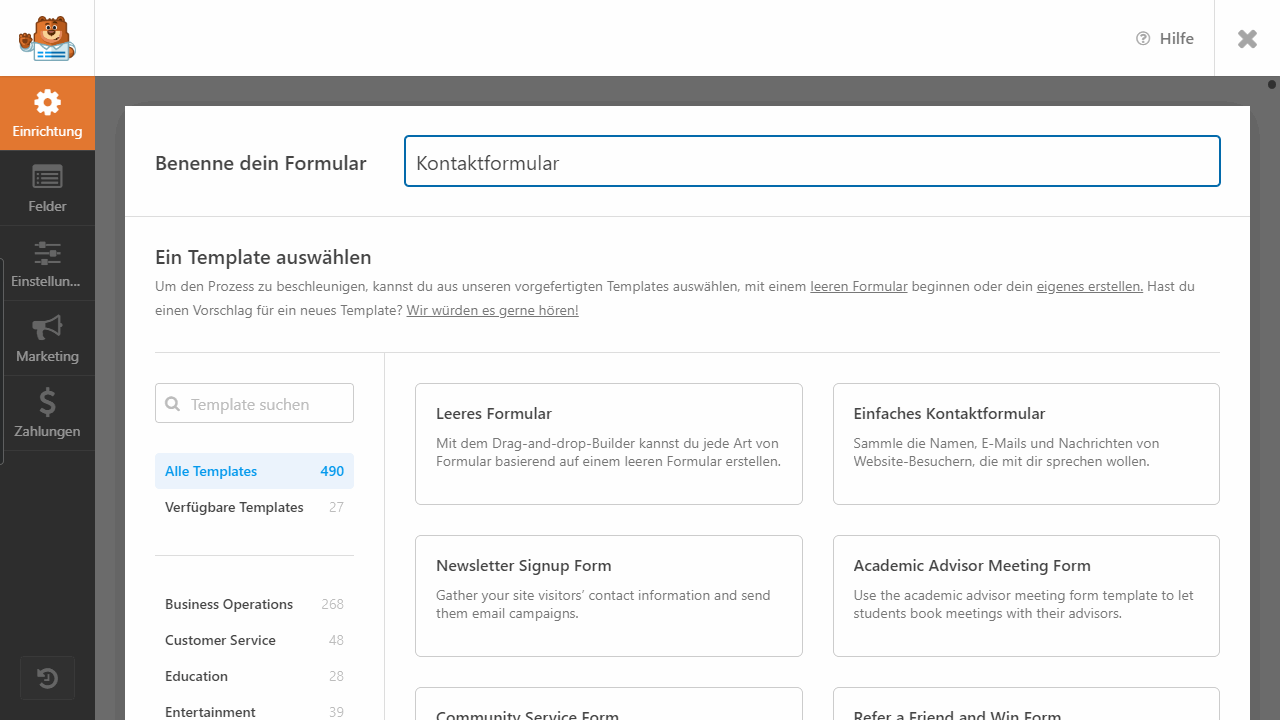
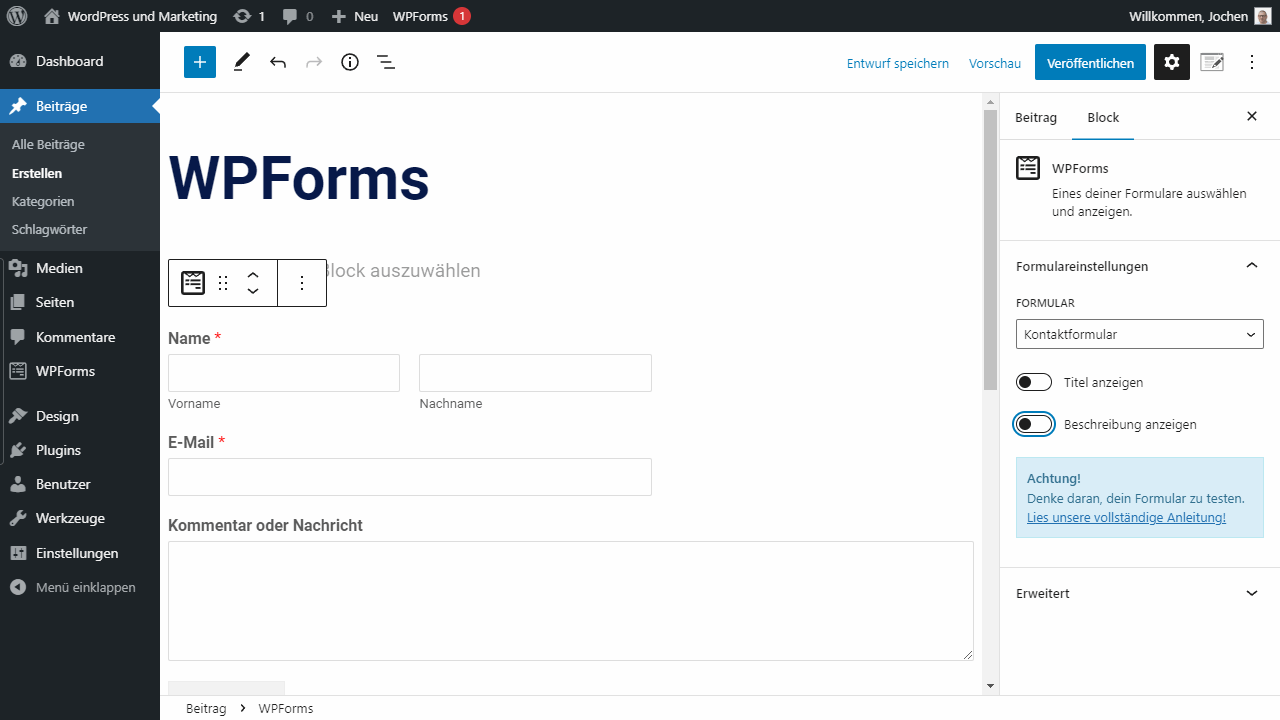
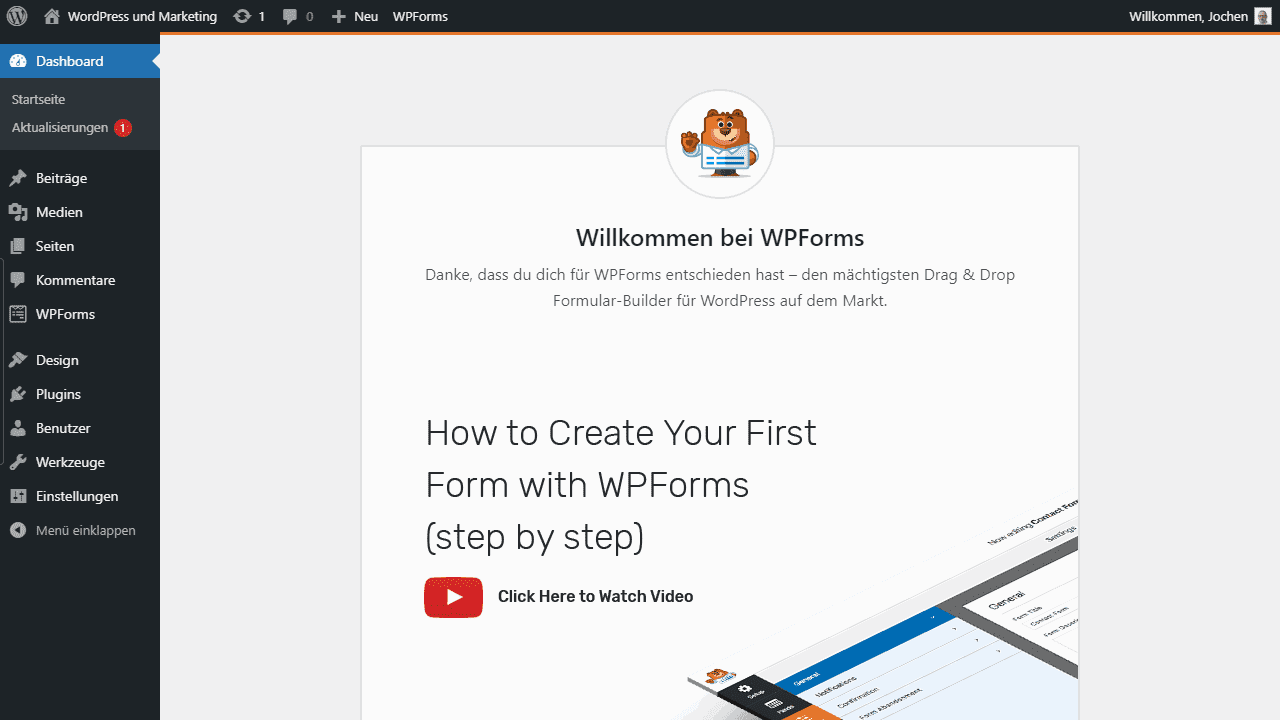
Advantages
- From the branded free version to the professional version with Salesforce integration, everyone chooses the exact rate that suits them.
- Forms are clicked together like in a Page-Builder
- From contact forms to payment forms and surveys, almost any type of form can be implemented
Disadvantages
- Not the cheapest plugin
2. Fluent Forms
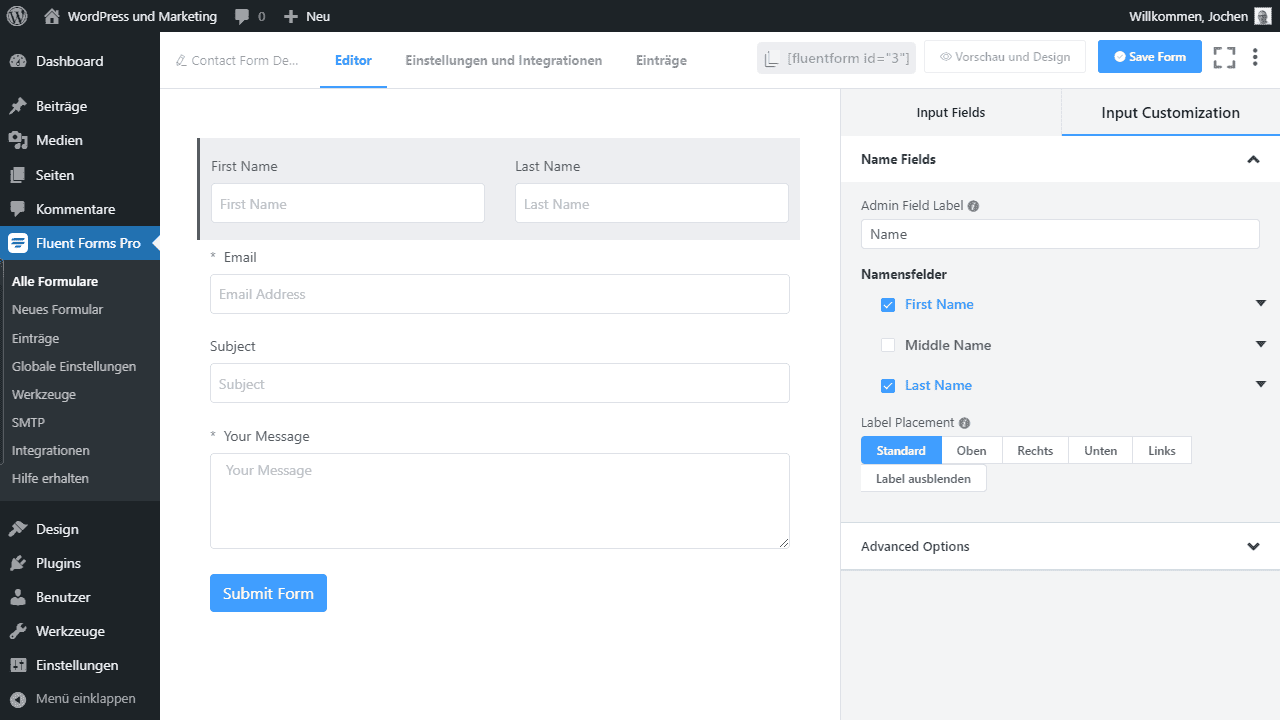
Fluent Forms (my review) also comes with a simple form builder that allows you to create different types of forms. Which fields you combine or create is completely up to you. The whole thing is done via drag-and-drop, so it’s anything but complicated and basically self-explanatory. One of the big promises of Fluent Forms is that you don’t have to pay for each new feature separately. If you buy the WordPress plugin in a subscription or as a lifetime license, you also have all the features without having to pay again later. This makes things pleasantly uncomplicated.
The basic version of Fluent Forms is available for free in the WordPress plugin directory. However, if you need additional integrations (HubSpot, etc.) or want to use special features such as payment forms, you have to purchase the premium version. You can buy the WordPress form plugin either as a subscription or as a one-time purchase with a lifetime license. Here you just have to ask yourself if you want to use Fluent Forms longer than a few years or not. The plugin has pretty much everything you will ever need in the premium version.
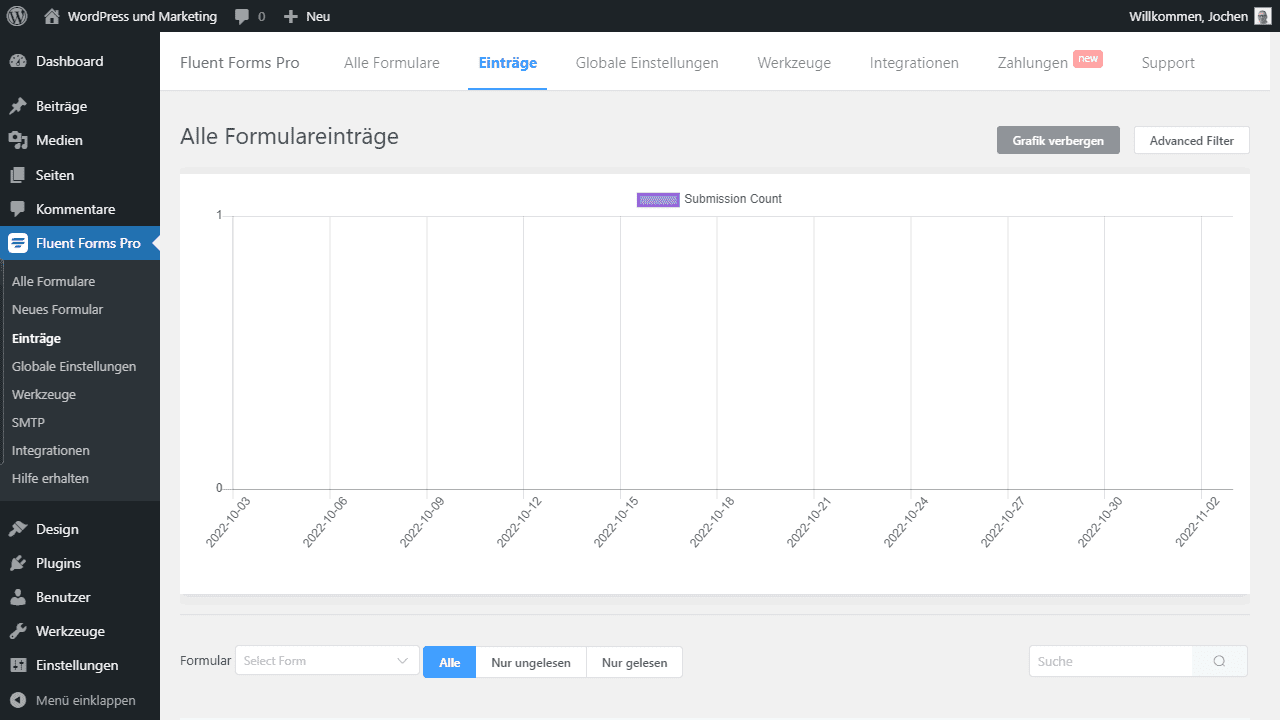
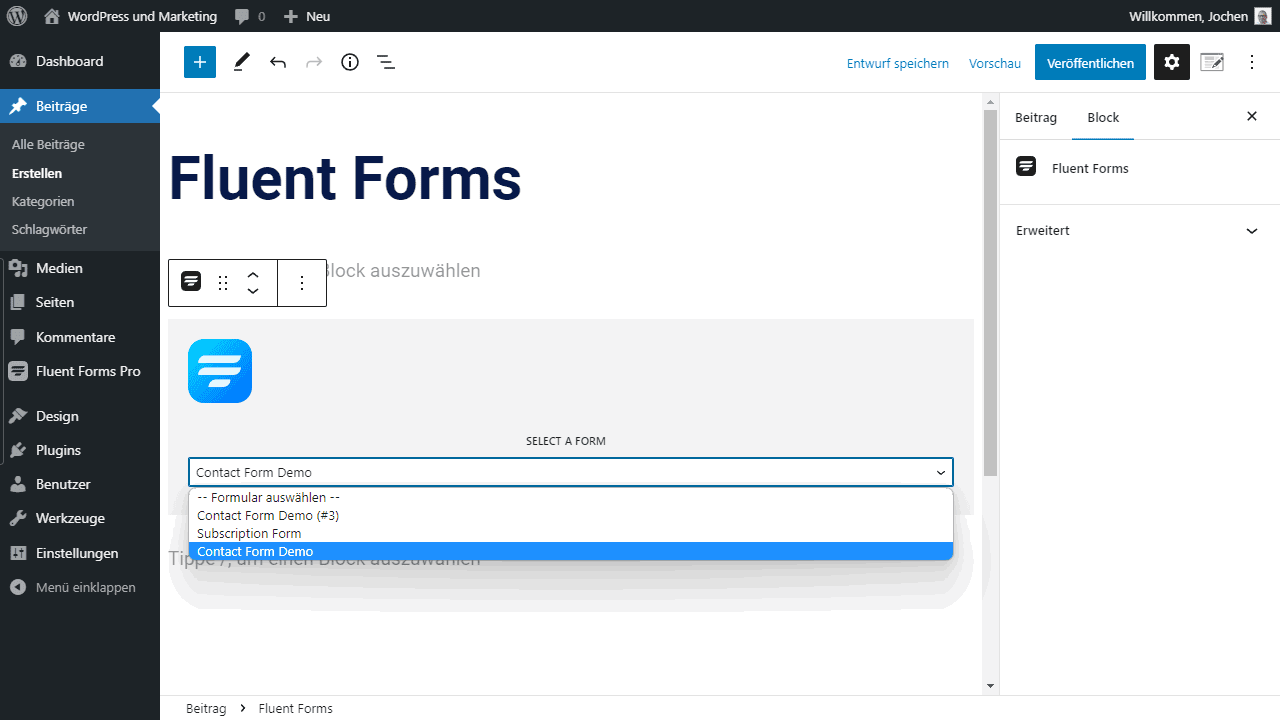
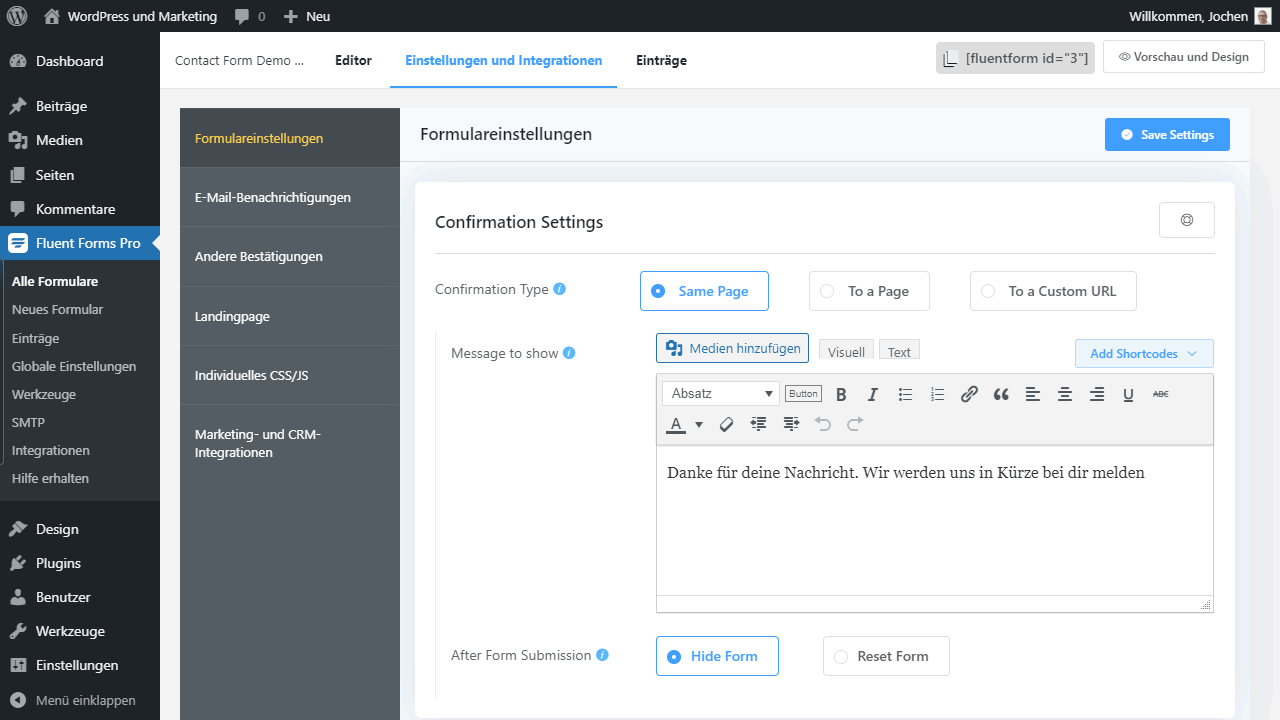
Advantages
- No features madness, everything is included in every tariff
- Free version is already powerful and the premium version is not mandatory
- Simple drag-and-drop editor for forms
Disadvantages
- Lifetime license is expensive and only worthwhile over many years
3. Gravity Forms
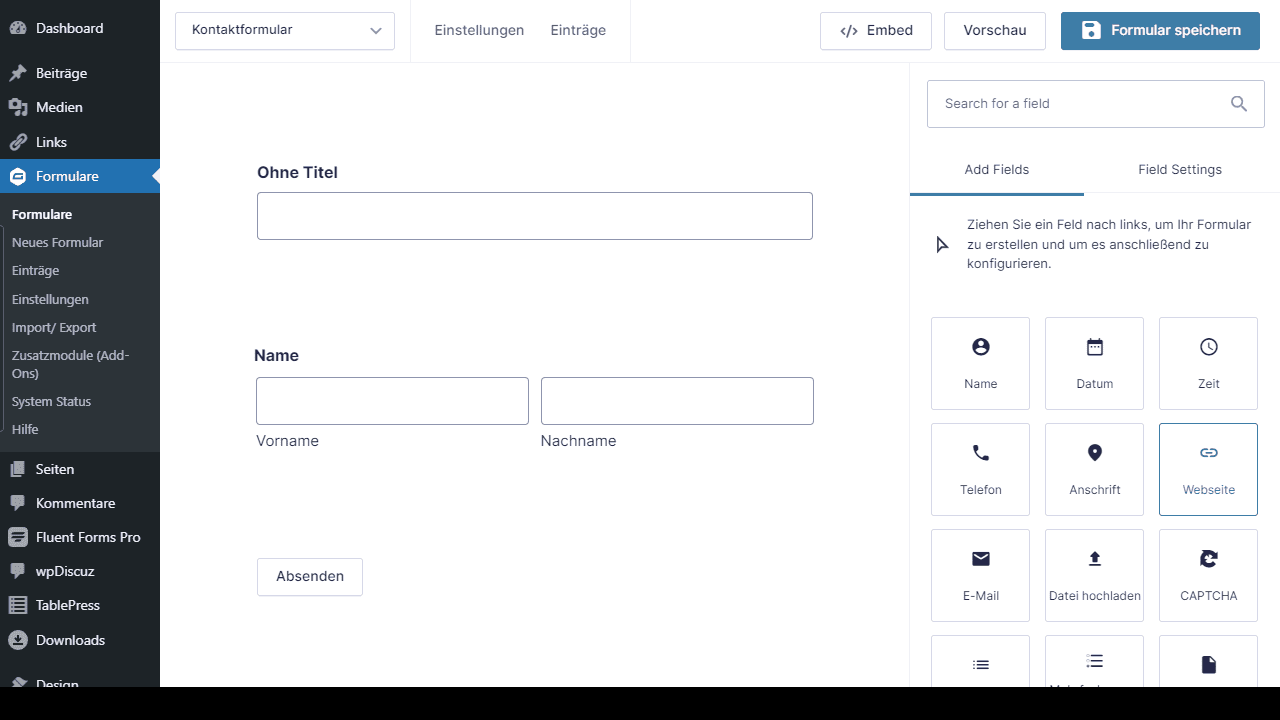
First of all, the drag-and-drop builder is really well done in Gravity Forms. Not only does it integrate seamlessly with the WordPress dashboard, it also allows you to quickly and directly assemble forms. These can even have multiple pages and have an option for users to save previous entries for later. Conditional Logic is also included, so that certain fields can be shown or hidden for certain visitors. Gravity Forms has many more features, which you can see on the website. To list everything here would be absurd.
However, what needs to be said clearly is that Gravity Forms staggers its addons according to the tariff. This can be annoying because you may have to spend money on certain integrations. For example, while reCAPTCHA or Mailchimp are included in all plans, connections to Dropbox or PayPal are only available from the Pro plan and those looking for even more complex combinations will then inevitably need the Elite subscription. I don’t like this kind of restriction so much, since certain functions are hidden behind a paywall here. So think about that beforehand if you need any of it.
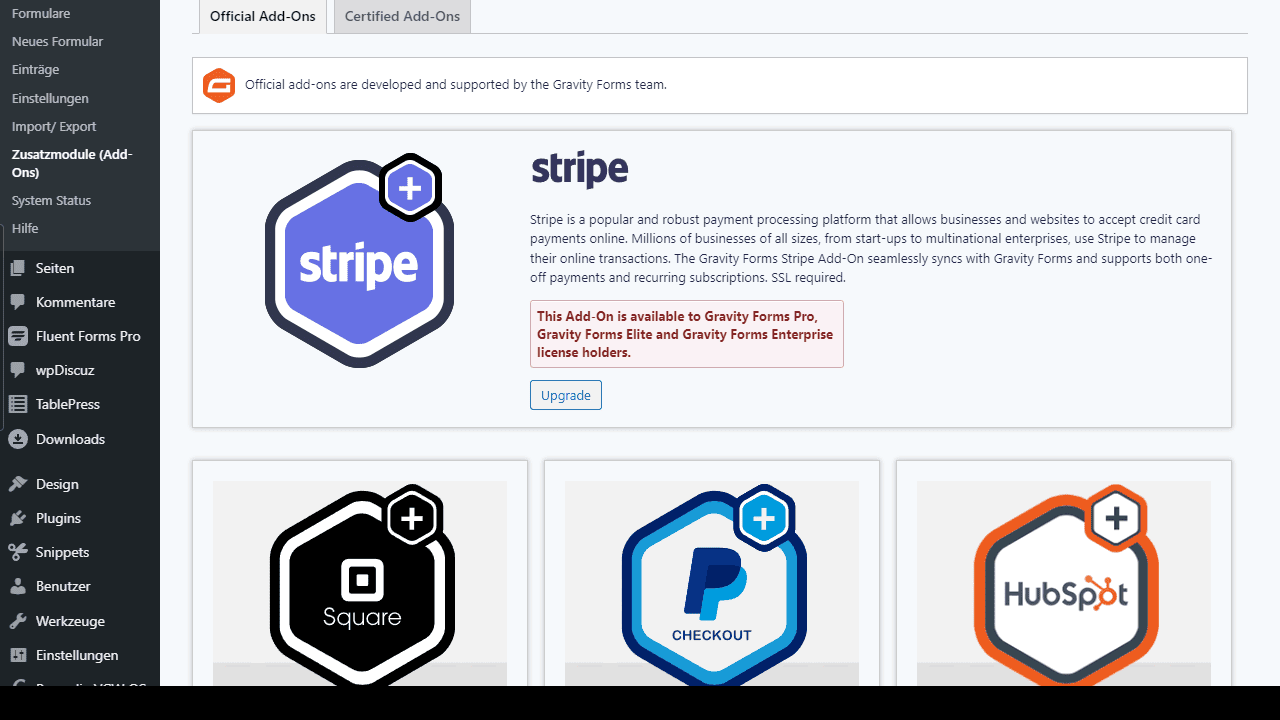
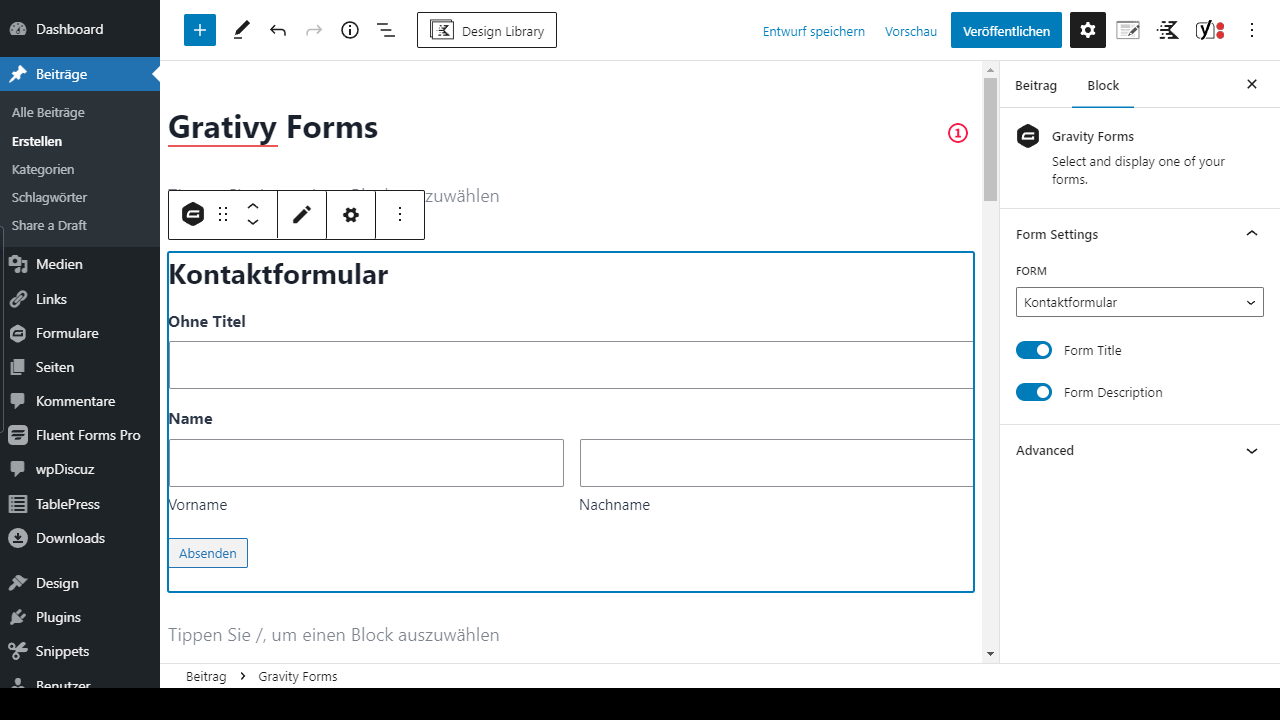
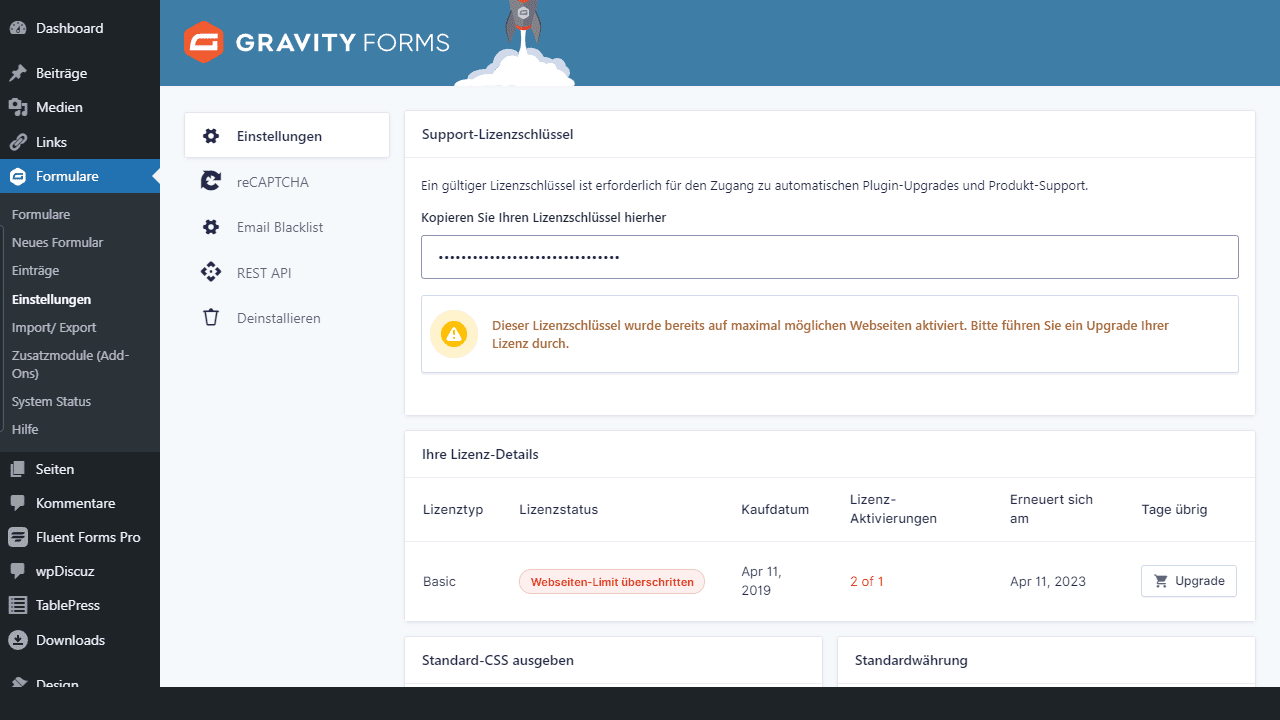
Advantages
- Super simple drag-and-drop builder for all kinds of forms
- Integrates great with the WordPress dashboard
Cons
- There is a paywall for certain connections and features
4. Ninja Forms
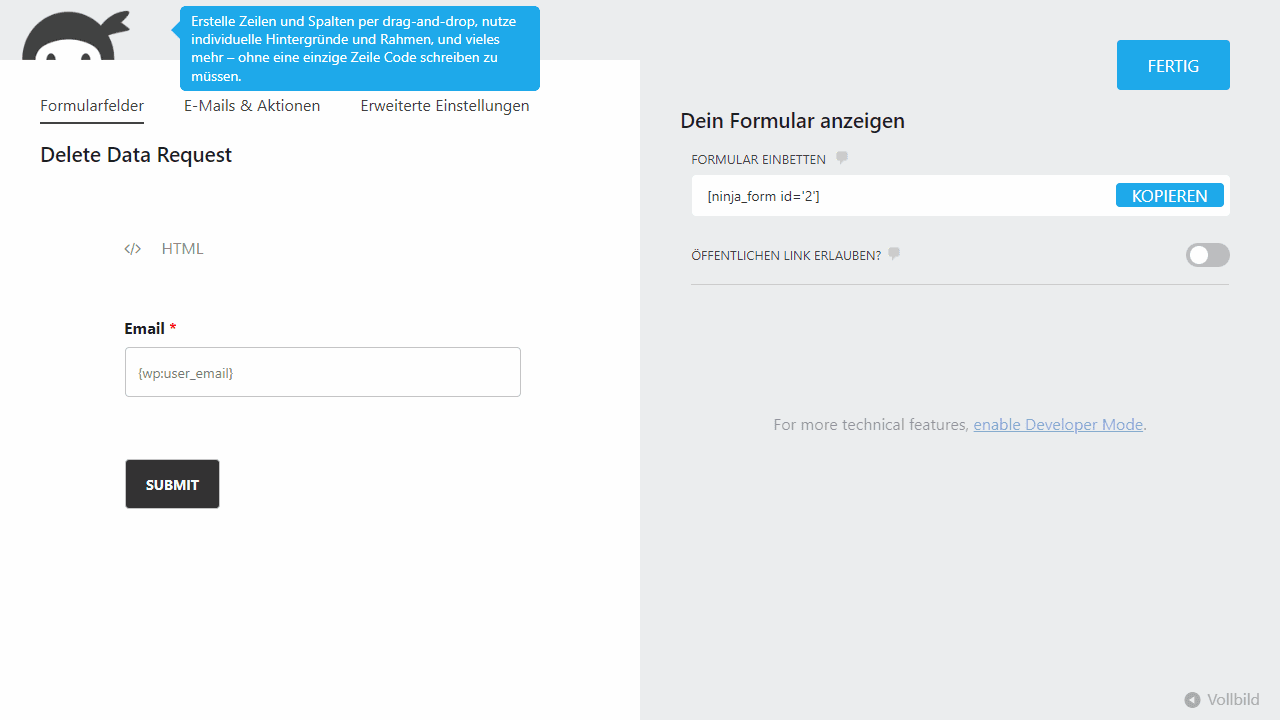
Ninja Forms describes itself as the supposedly simplest solution that is one hundred percent beginner-friendly. I think this is true because the plugin has been designed to be effortless to use. No matter what your level of WordPress knowledge is, with Ninja Forms you’ll be able to create forms in no time. You simply click together the basics and fall back on appropriate templates that can be quickly adapted. If you need something more, e.g. uploads or payment forms, this can also be realized with Ninja Forms without any problems.
The payment model is solved discreetly different and interesting with Ninja Forms. The tariffs differ foremost in the number of domains on which Ninja Forms can be used. You probably already know this from other WordPress plugins. What’s exciting here is the idea that a certain number of addons are already included. In addition, depending on the tariff, there are different discounts on additional addons. The addons here are integrations of newsletter systems or payment providers. In other words, everything that goes beyond the forms themselves or extends them even further. This is an unusual solution and not everyone will like it. But I find the idea relatively good. Especially because in theory I only have to pay for features I actually use and not for everything, even if I don’t use it.
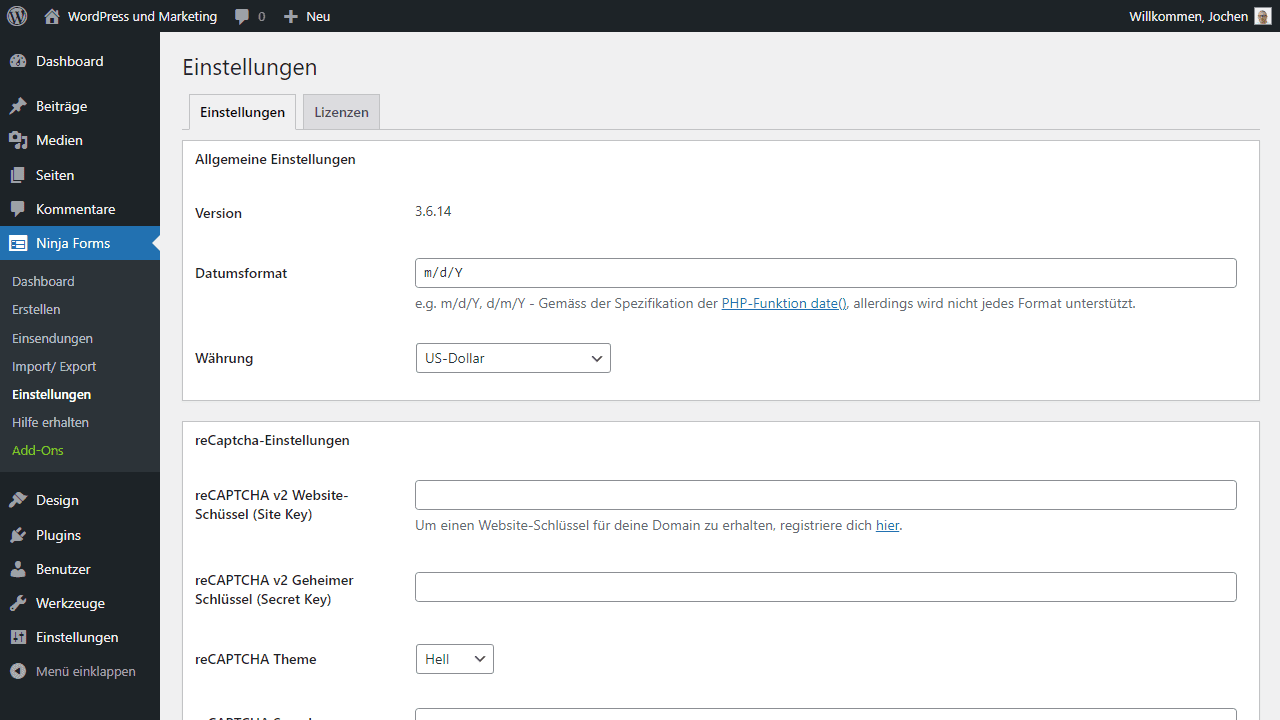
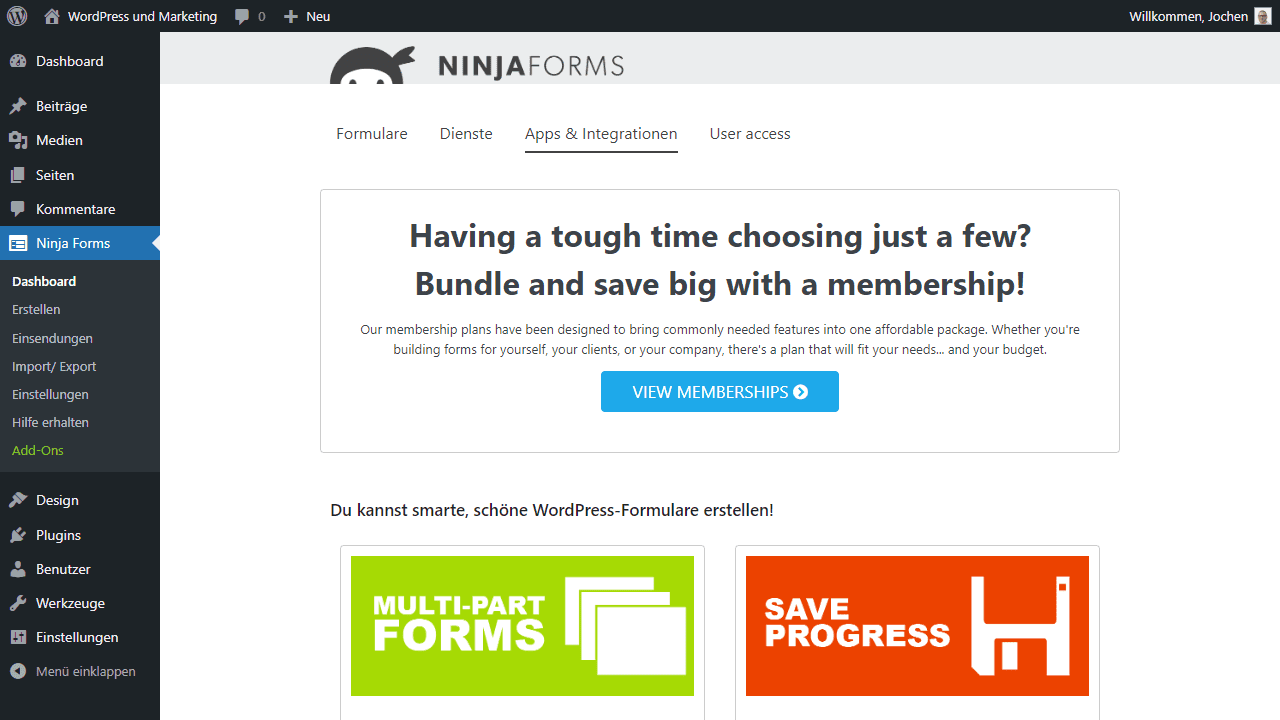
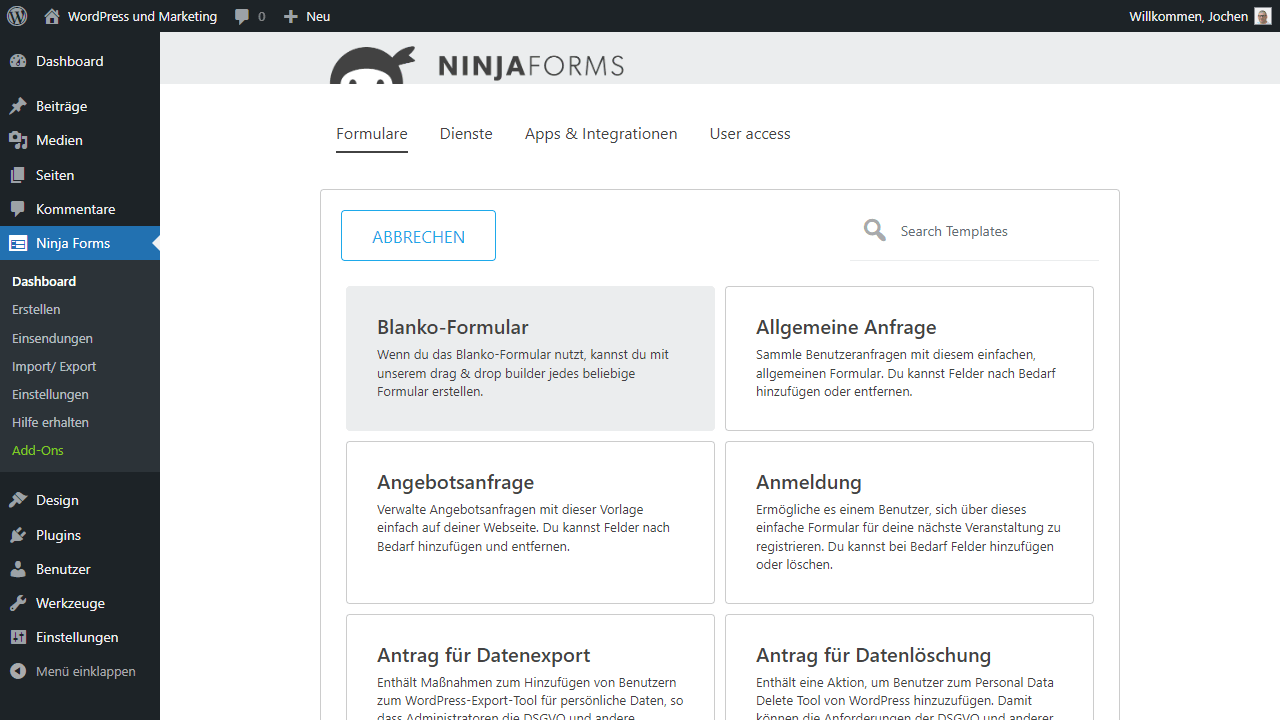
Advantages
- Payment model allows to pay only for what is needed, which is an interesting solution
- Standard scope is already sufficient for many purposes
- Very easy form creation even without much WordPress knowledge
Disadvantages
- Pricing model is a good idea, but can be expensive if you need many addons
5. Formidable Forms
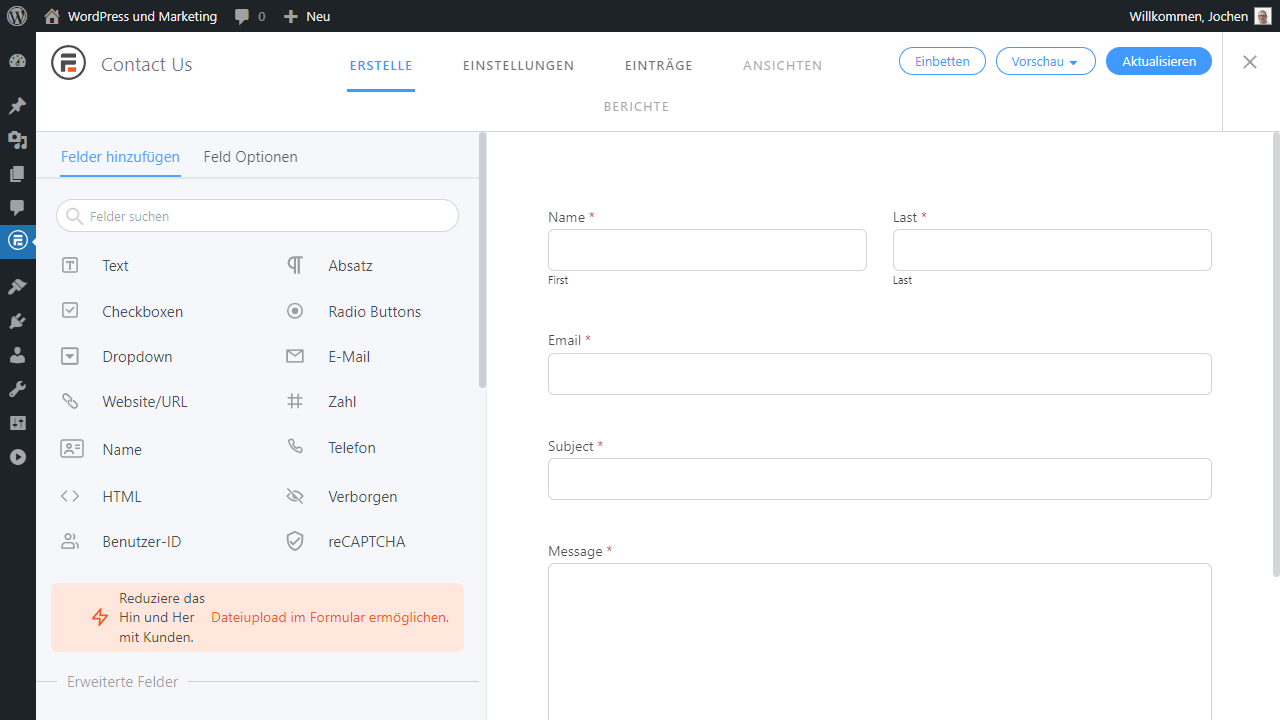
The WordPress plugin Formidable Forms announces right at the beginning that it is much more than just a form plugin with drag-and-drop builder. It wants to offer more, such as quiz games or self-created calculators. All of this is realized via the corresponding form fields. So from polls to quizzes to calculators and many more functions, you can implement pretty much anything. This is handy if you need more than just a contact form or registration form and want to create a price calculator for your website, for example.
To extend the already massive range of functions, there are also appropriate addons for Formidable Forms. These add geolocation, SMS voting or user tracking. Payment forms with Stripe, PayPal and others can be implemented as well as classic newsletter integrations with Mailchimp. I would almost say that Formidable Forms is one of the most powerful form plugins for WordPress. So if you work a lot with forms and also want to implement more complex functions very easily, Formidable Forms is just right.
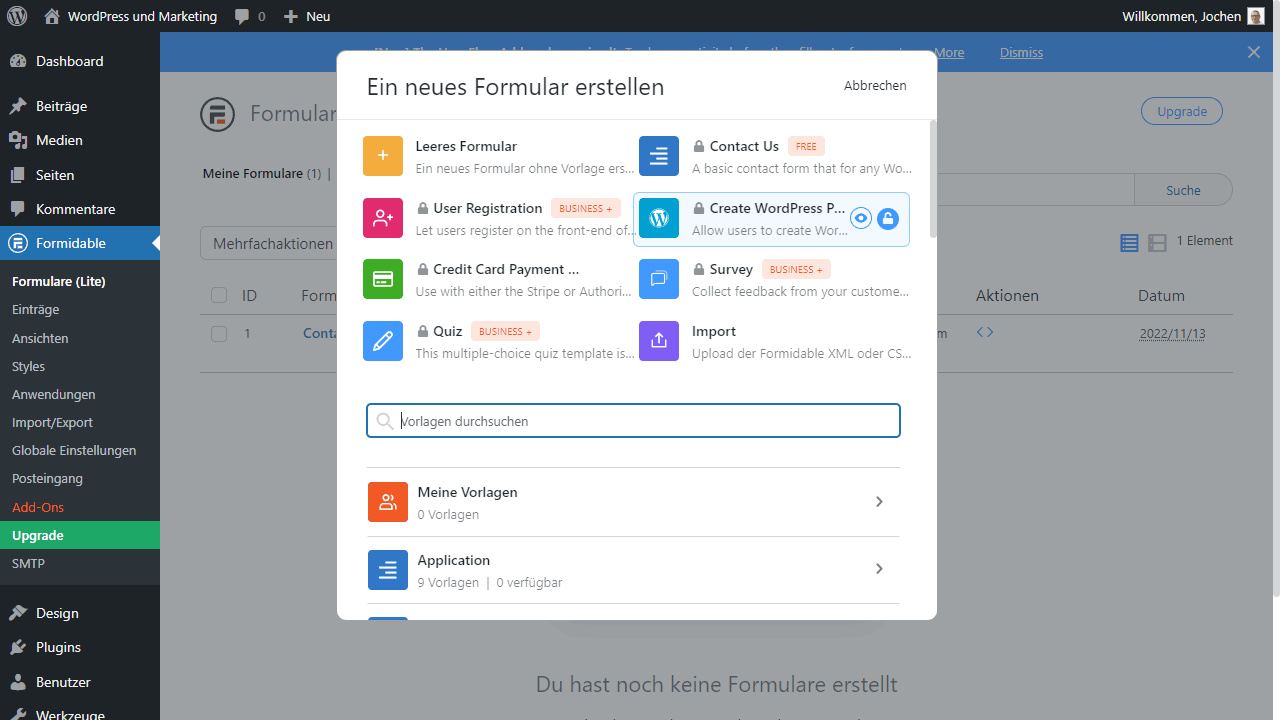
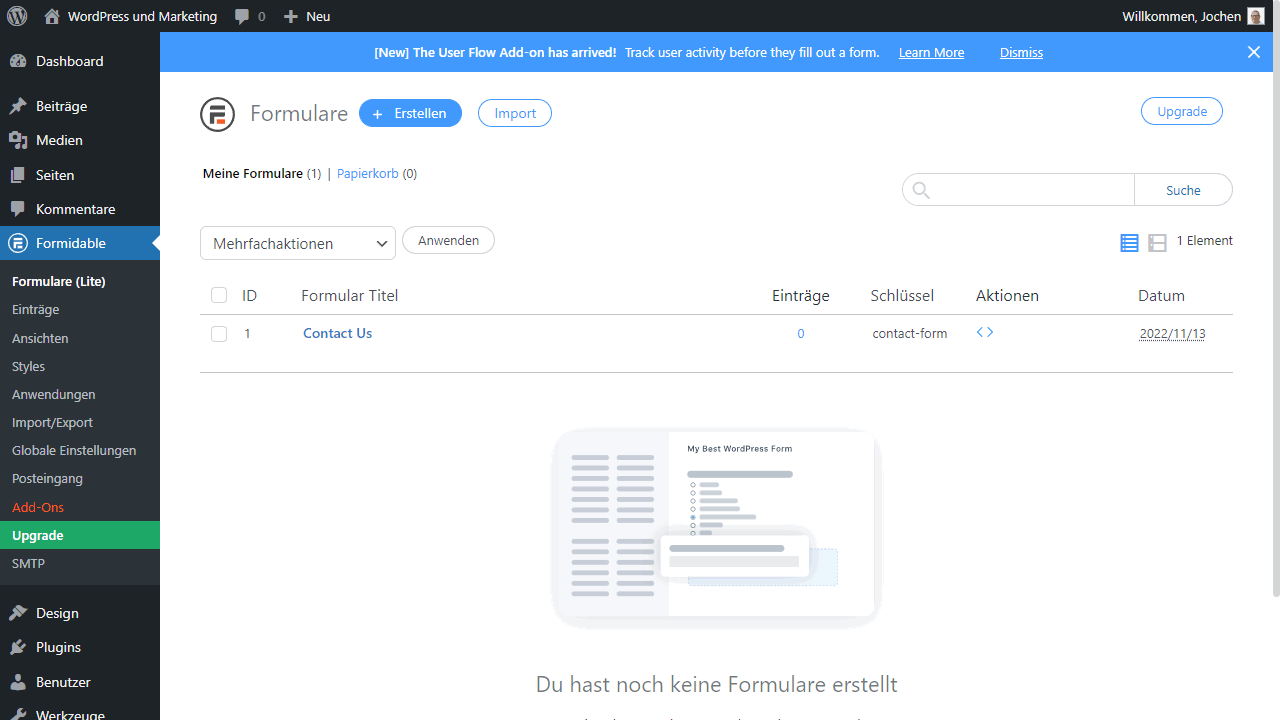
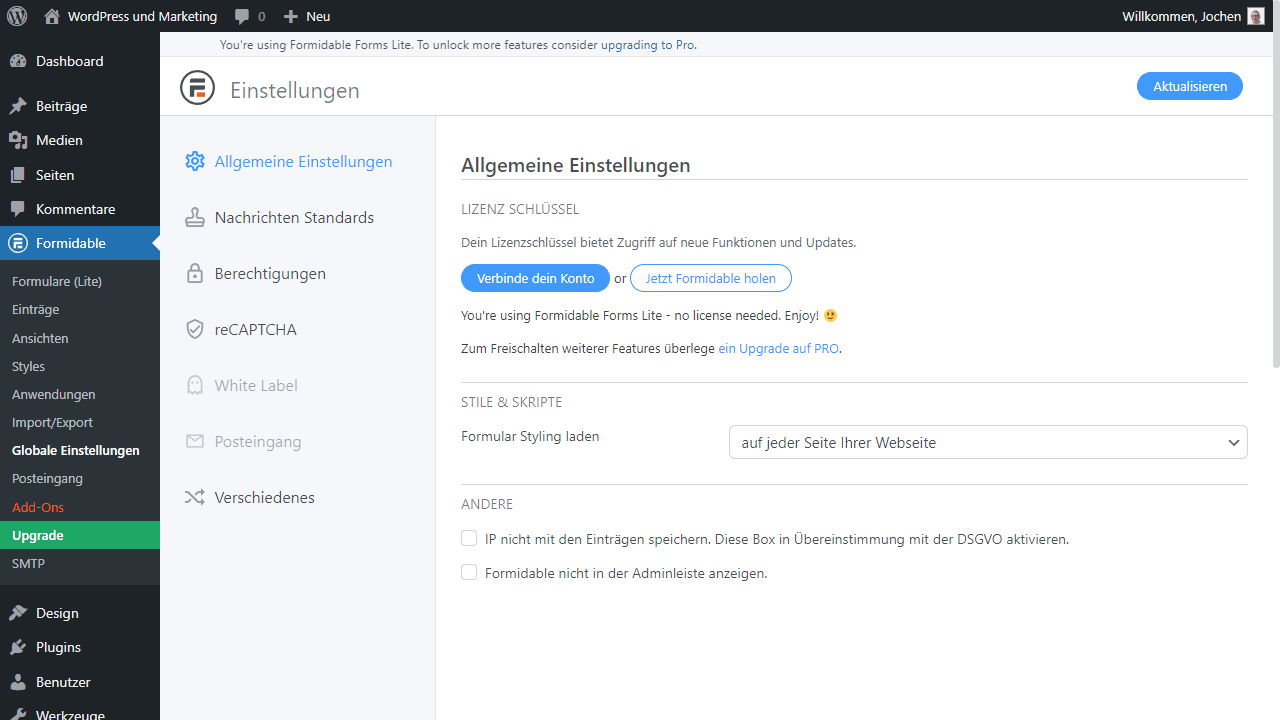
Advantages
- Compelling form plugin, which goes far beyond the standard features
- Many forms possible, including templates
- Even price calculators or quiz games can be implemented here
Disadvantages
- Prices decide which features may be used and which not
6. Everest Forms
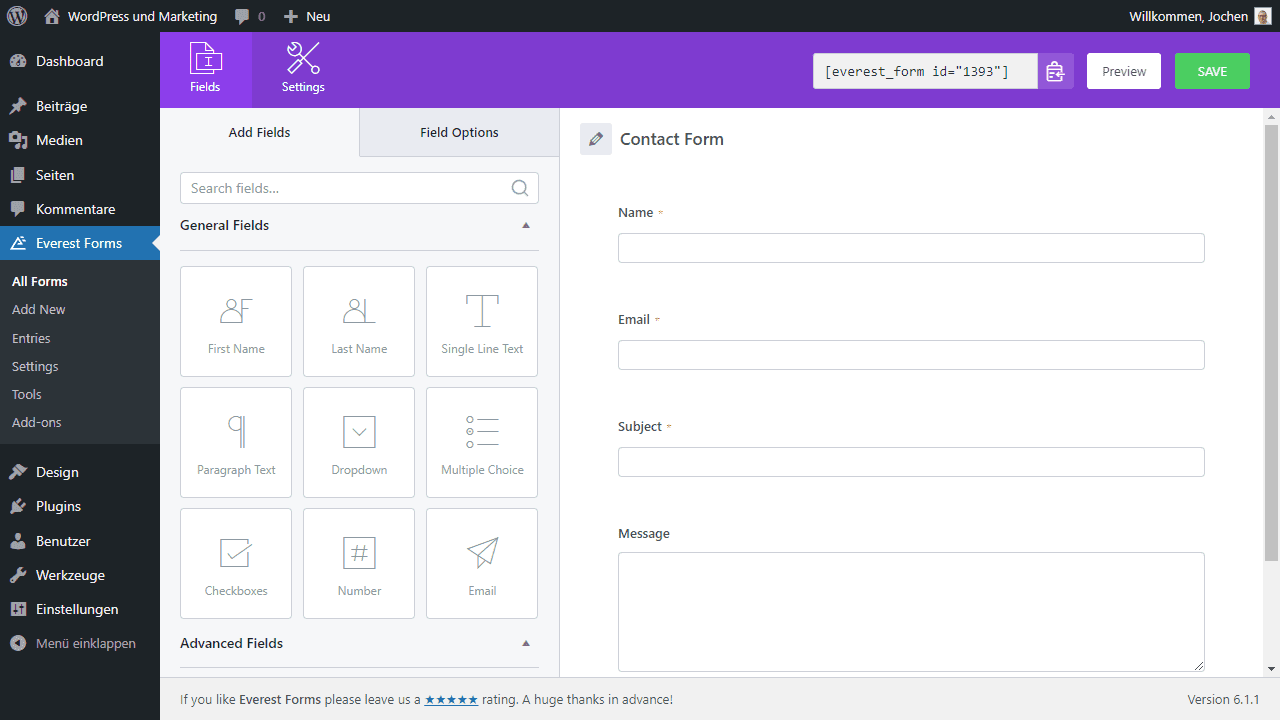
Everest Forms also convinces with a solid drag-and-drop form builder, as it has become common. In addition, there is a large library of templates to match, which can be adopted quickly and easily. In this way, you can save yourself the trouble of creating many standard forms by using one of the ready-made templates. Submitted form data will be visible directly within WordPress, so you won’t lose anything. By the way, there is no limit to the number of forms, Everest Forms can create as many forms as you need. The forms themselves are submitted without reloading the page, as it should be nowadays.
Everest Forms is also free, but like almost all WordPress plugins it can be extended via a premium version. So if you pay, you get a little more. This ranges from forms for submitting posts, payment and marketing integrations, to self-created registration forms so that users are allowed to register with you on the blog accordingly. There’s a lot you can do, though as mentioned, the basic functionality of Everest Forms remains free for now.
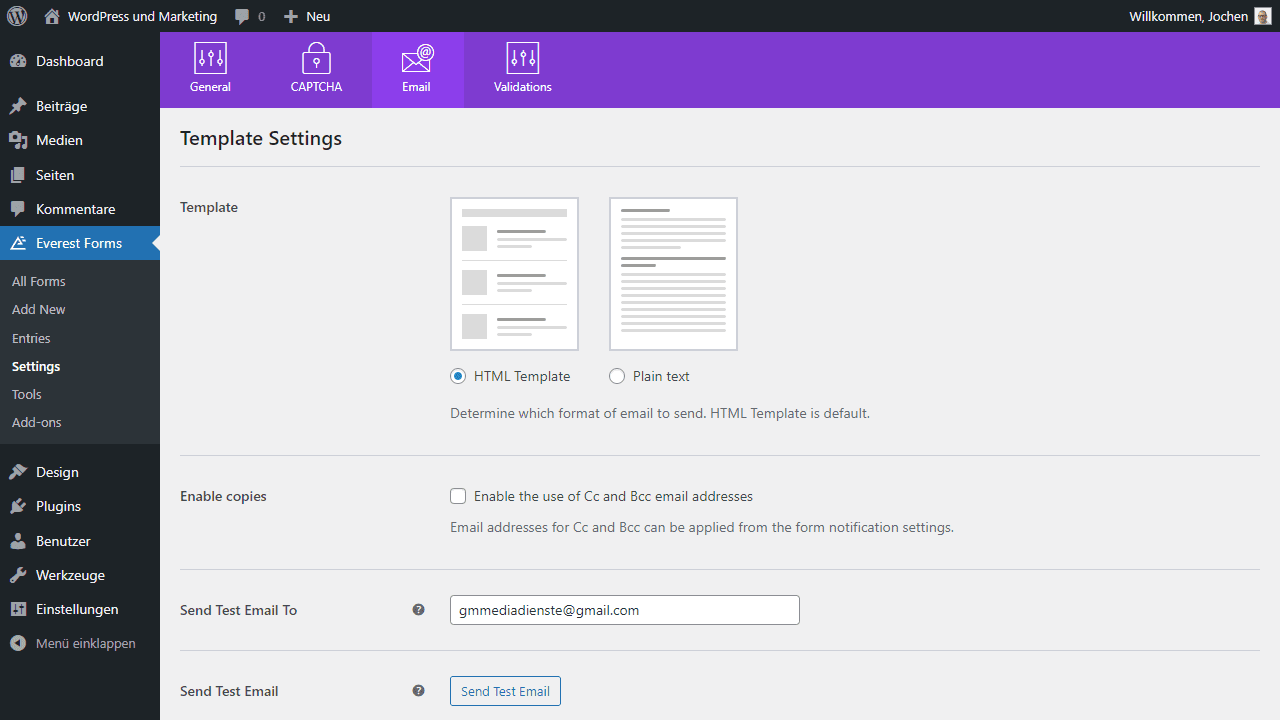
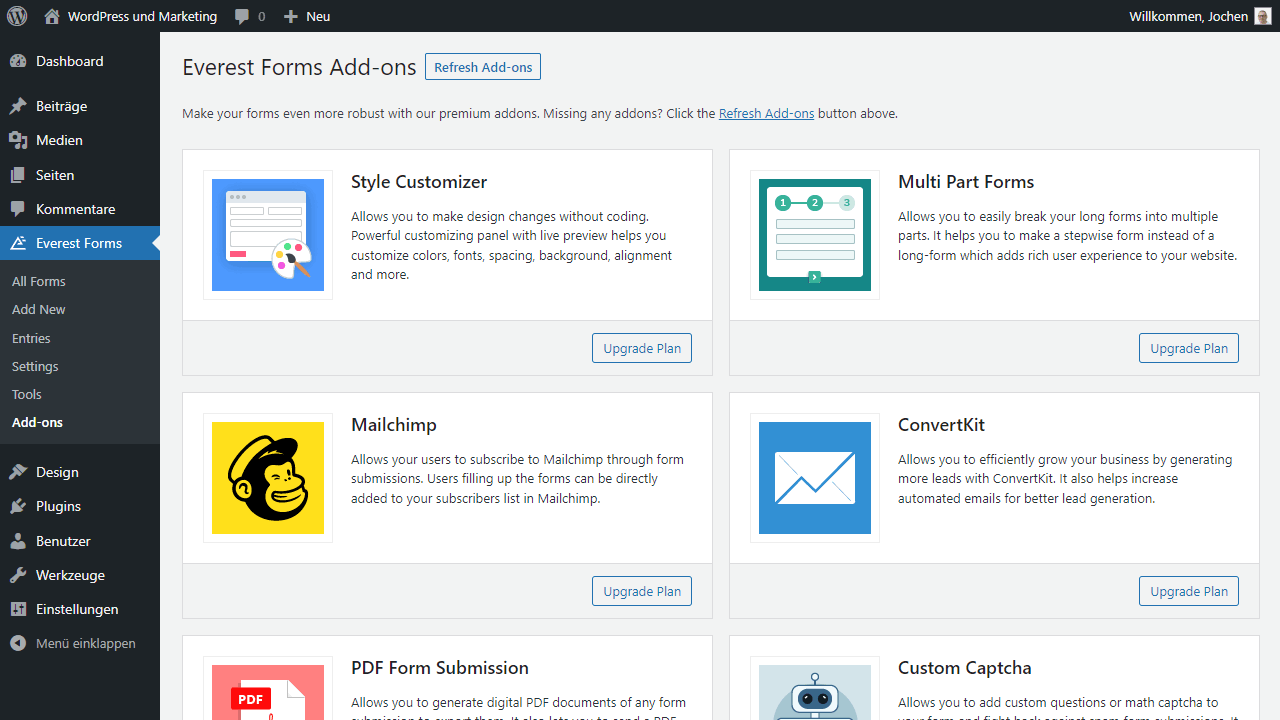
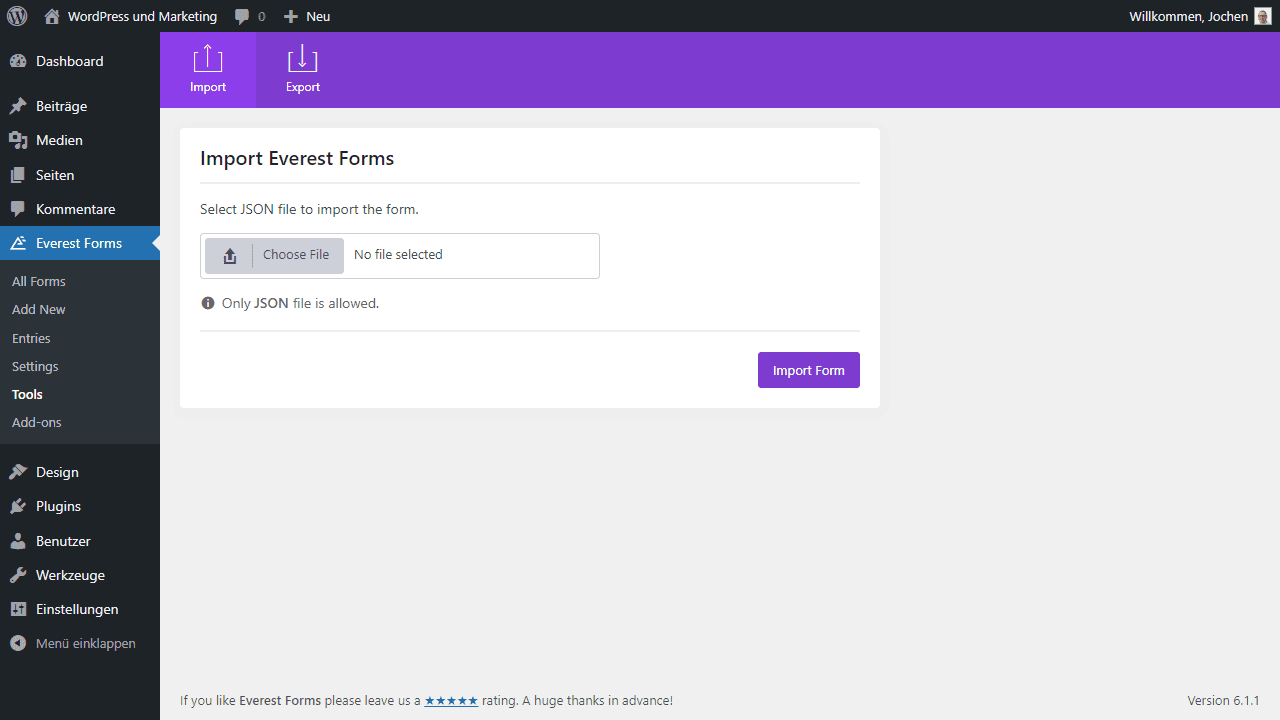
Advantages
- Free version allows almost everything that common forms need
- Many functions are very cleanly and directly integrated into the WordPress dashboard and therefore do not require any detours
Disadvantages
- None known
7. Quform2
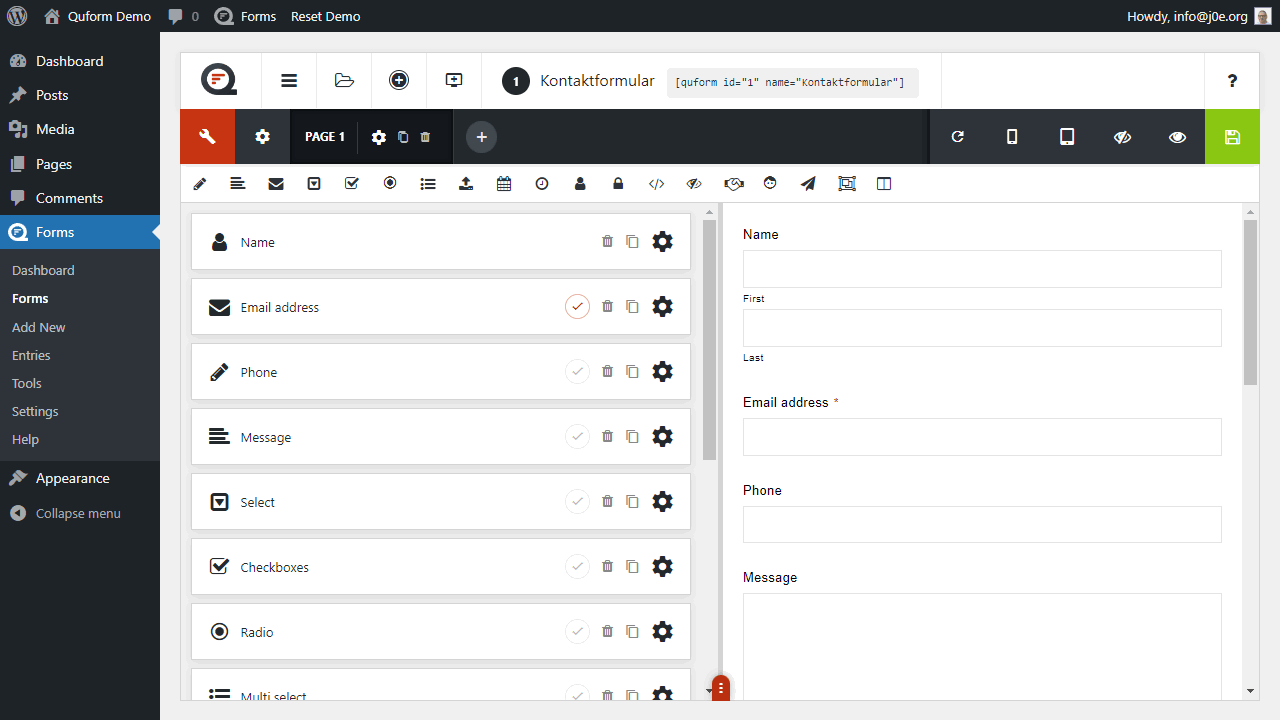
What I really like about Quform2 is that you have no ongoing costs here and the price is also kept rather low in general. Most WordPress form plugins are only available by subscription. This is quite different with Quform2. This is a one-time purchase through the marketplace of Envato. Either in the normal version or just in the extended one. In terms of features, Quform2 supports, for example, the invisible reCAPTCHA, masters the WordPress “Conditional logic”, can send automatic responses and has various elements that can be added to the form.
In the end, Quform2 is not a comprehensive form builder like other plugins from this list, which should be clear to you in advance. But Quform2 is a cheap lightweight for forms. What kind of forms are possible is presented on the product page as a live demo. Surveys, registrations and contact forms are no problem. Not to the same extent as the big plugins in this area, but sometimes you don’t need a bloated solution for success.
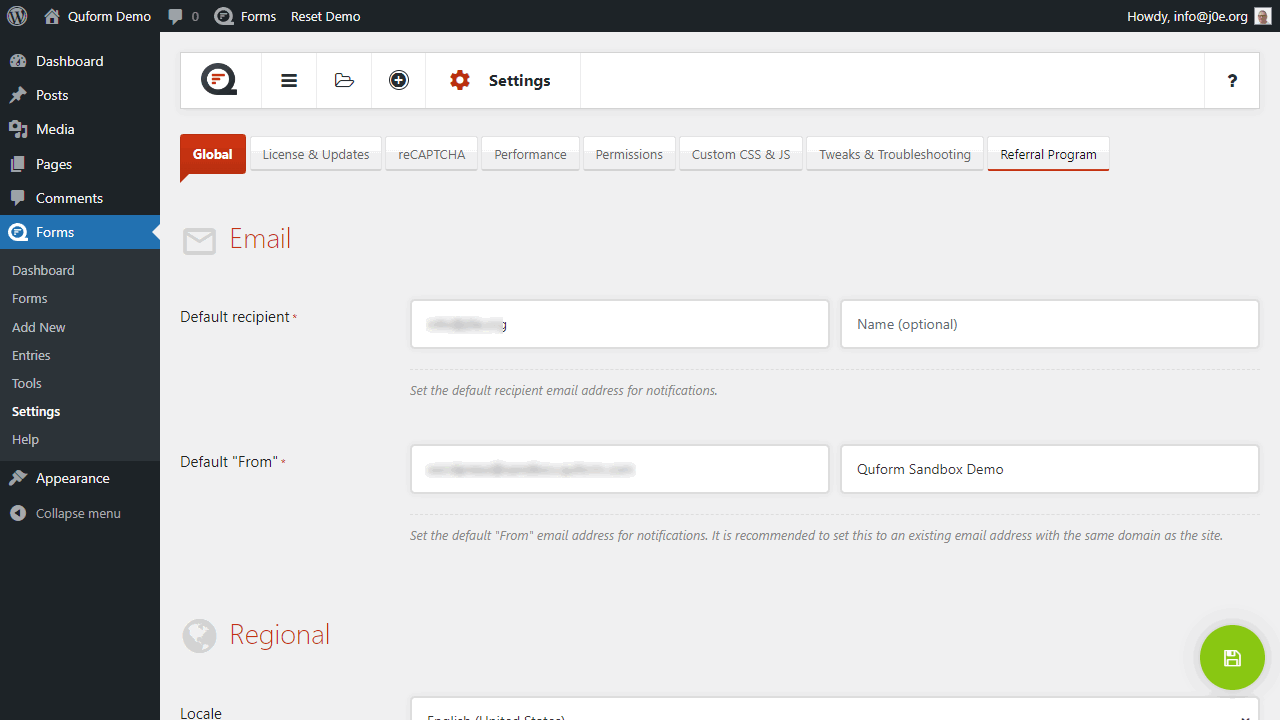
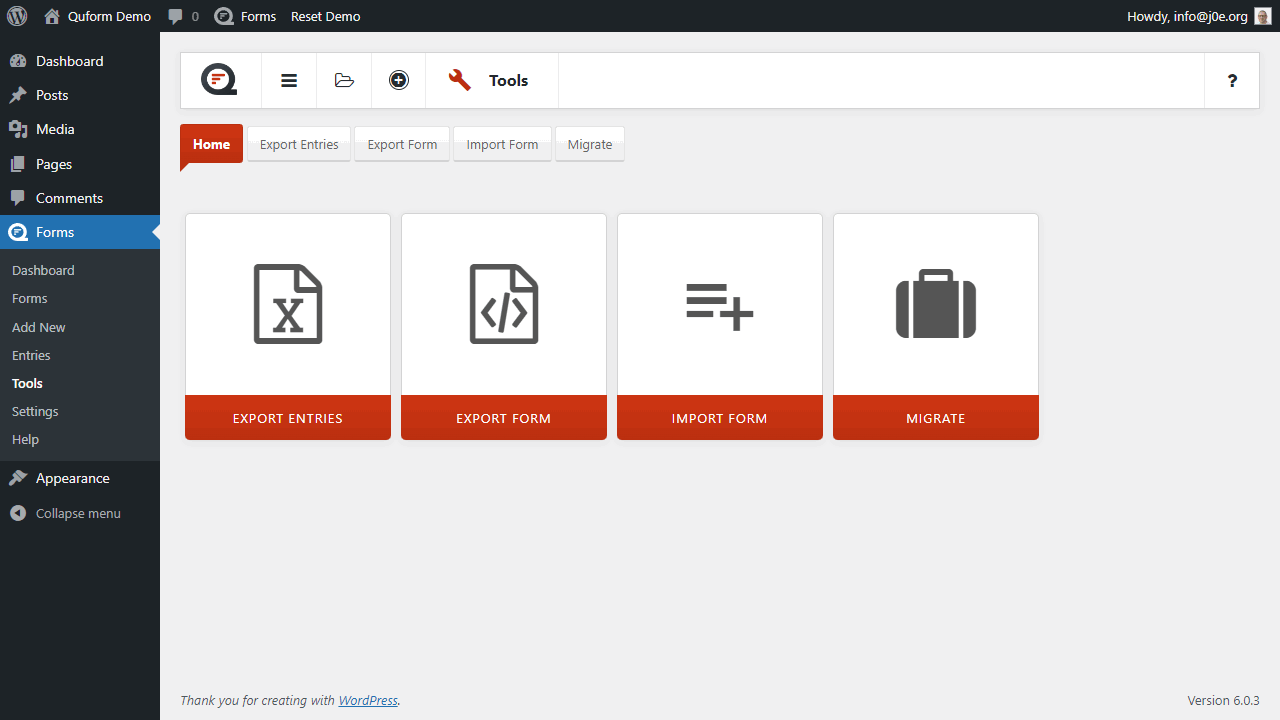
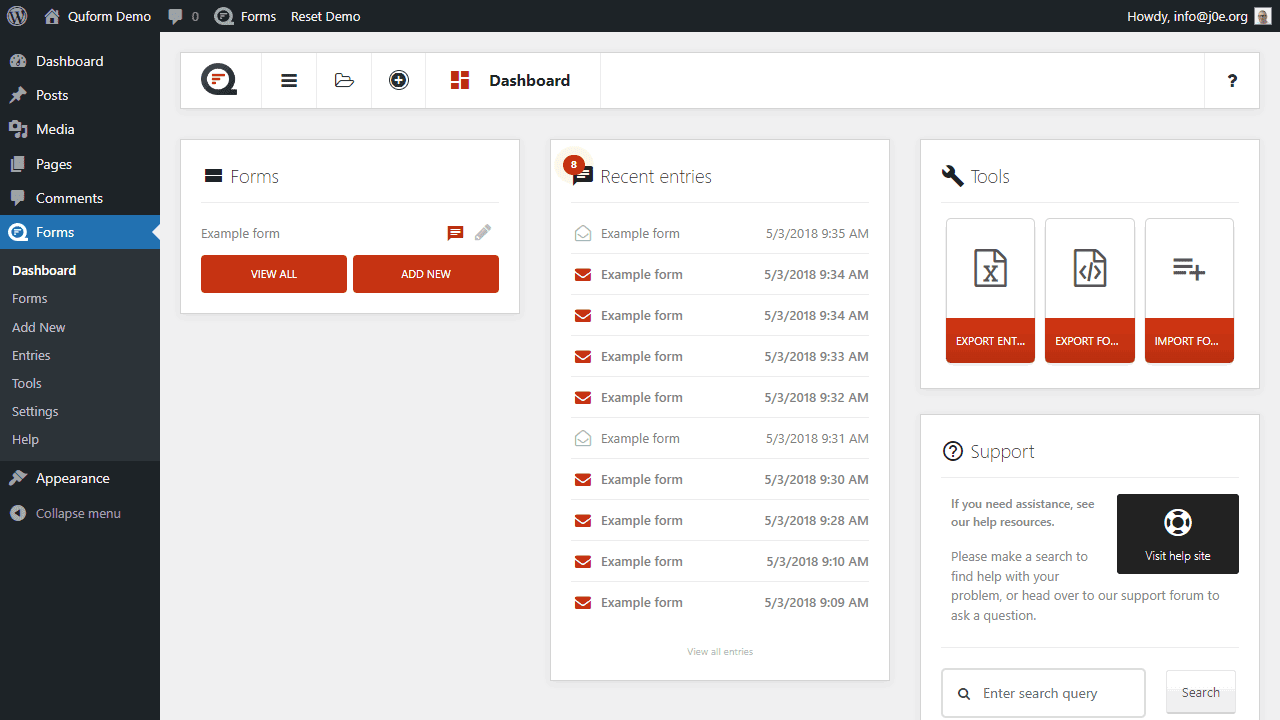
Advantages
- One-time purchase instead of expensive subscription
- All forms that are needed in everyday life can be easily implemented with Quform2
Disadvantages
- Functionality somewhat limited compared to other form plugins for WordPress
8. Elementor Form Widget
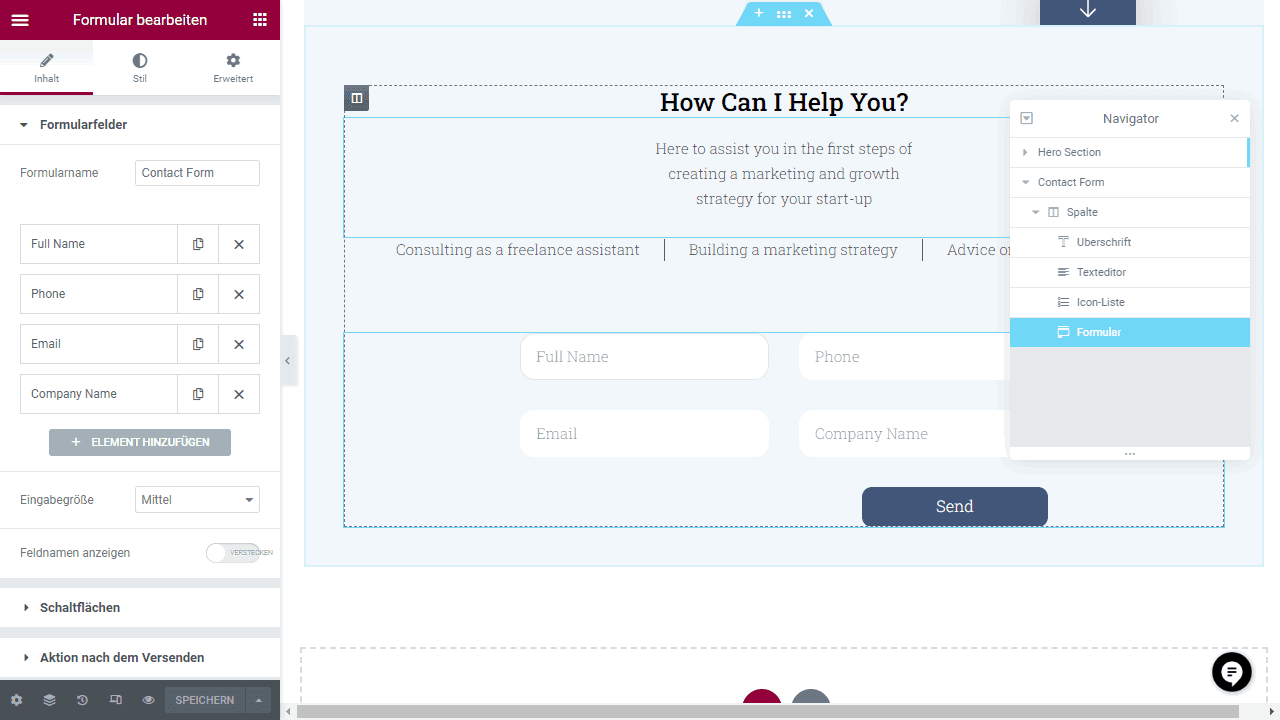
If you don’t want to or don’t have the money to buy another plugin just for forms, you might want to consider the Elementor Page-Builder. If this is in use, forms within WordPress are no longer a problem. The form widget of Elementor makes it possible. It allows you to create forms as easily as you can create anything else with Elementor. This means that if you already use Elementor, you can safely do without another expensive WordPress form plugin.
The forms you create with Elementor end up being very comprehensive, but of course not quite as powerful as using a plugin for these purposes. This is also due to the interfaces that other plugins sometimes provide. With Elementor, a lot is feasible, but in the end you will see quite clearly the limits of what is possible. However, that doesn’t matter. The truth is: Elementor is already sufficient for many forms. Especially when it comes to simple contact forms.
Advantages
- Included in Elementor Page-Builder
- Sufficient for all common standard forms
Disadvantages
- No complex connections possible
- Only with Elementor Pro
9. Divi Form Module
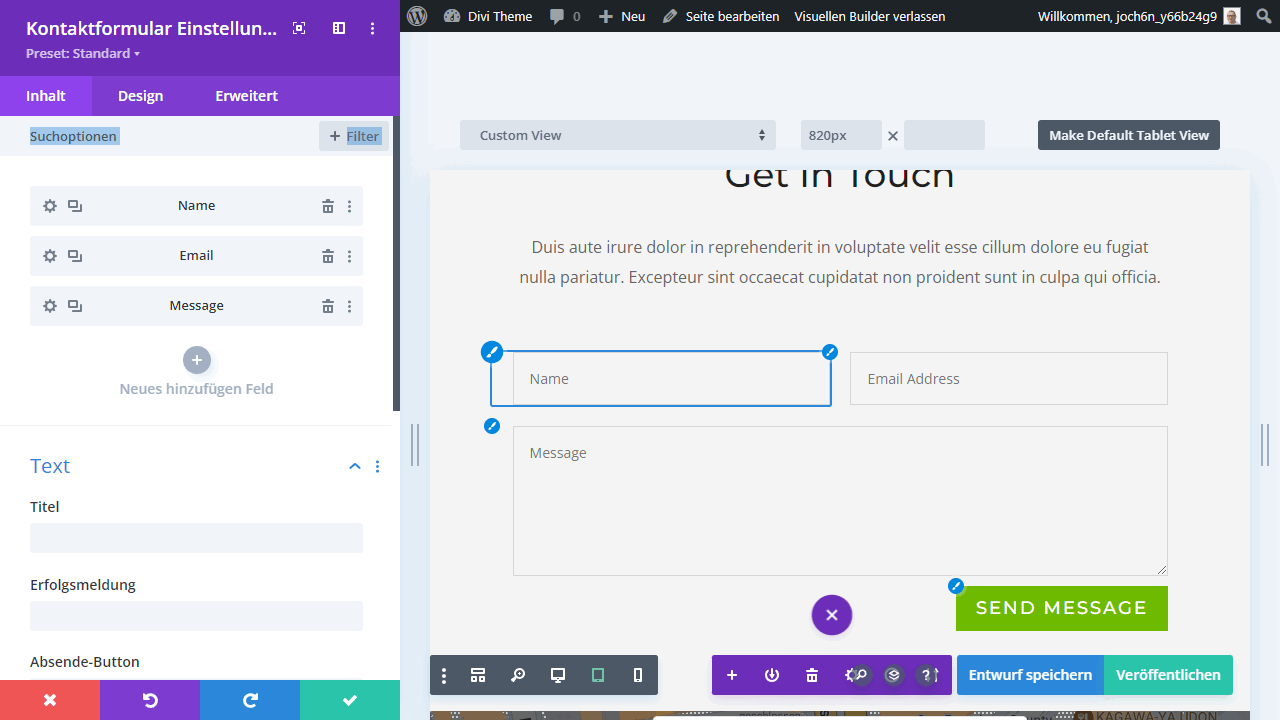
What the Elementor Page-Builder can do, the Divi Theme naturally wants to offer as well. With the Divi Form Module, this is exactly the case. With this, forms are easily and quickly created in Divi, which can then be inserted on any WordPress page and post. Just like any other module. The module is then edited in the same way. So you don’t need to worry about it working a little differently. Everything is the way it is handled with every module in Divi.
As before, you should not expect miracles here. Of course, the Divi form module doesn’t offer such complex possibilities as the corresponding WordPress form plugins do. But for that, it doesn’t cost any extra money either, but is already included in Divi. You should always keep that in mind when you start a comparison. For simple contact forms and a bit more, the Divi form module is already sufficient. And if you already have Divi licensed, it won’t cost you a cent.
Advantages
- If you have Divi, you also have the form module
- Sufficient for all common standard forms in WordPress
Disadvantages
- Complicated forms are not possible with this
10. Jetpack Form Block
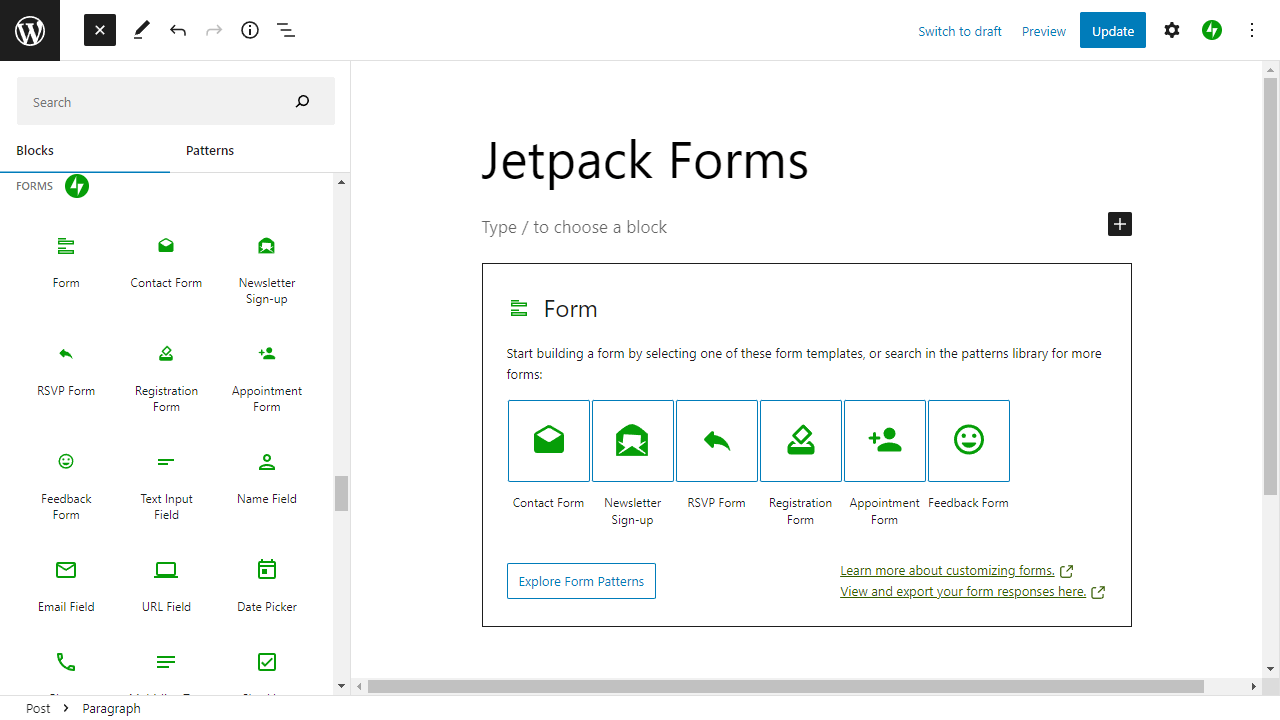
Jetpack is a kind of plugin collection from Automattic, the developers of WordPress. There are many features included in Jetpack and these can often even be added individually. From backups to security scans, everything is represented and Jetpack Forms is also included by default. The form block for the block editor can be unlocked by activating the contact form within WordPress. From then on, the new block is available and can be used. The form of Jetpack has different templates. Among them are the contact form, the newsletter signup, a registration, a form for appointments and feedback.
In the process, you can specify where the form should be sent and what subject it has. The form block itself is an individual block type, which in turn contains other blocks. In the block, each field of the form is therefore a kind of child block. However, the other options are severely limited with Jetpack Forms. There is newsletter integration from Creative Mail and CRM integration with Jetpack CRM, but aside from that, not too much is to be expected. So Jetpack Forms allows you to have rather simple forms, not complexly designed and highly customized solutions.
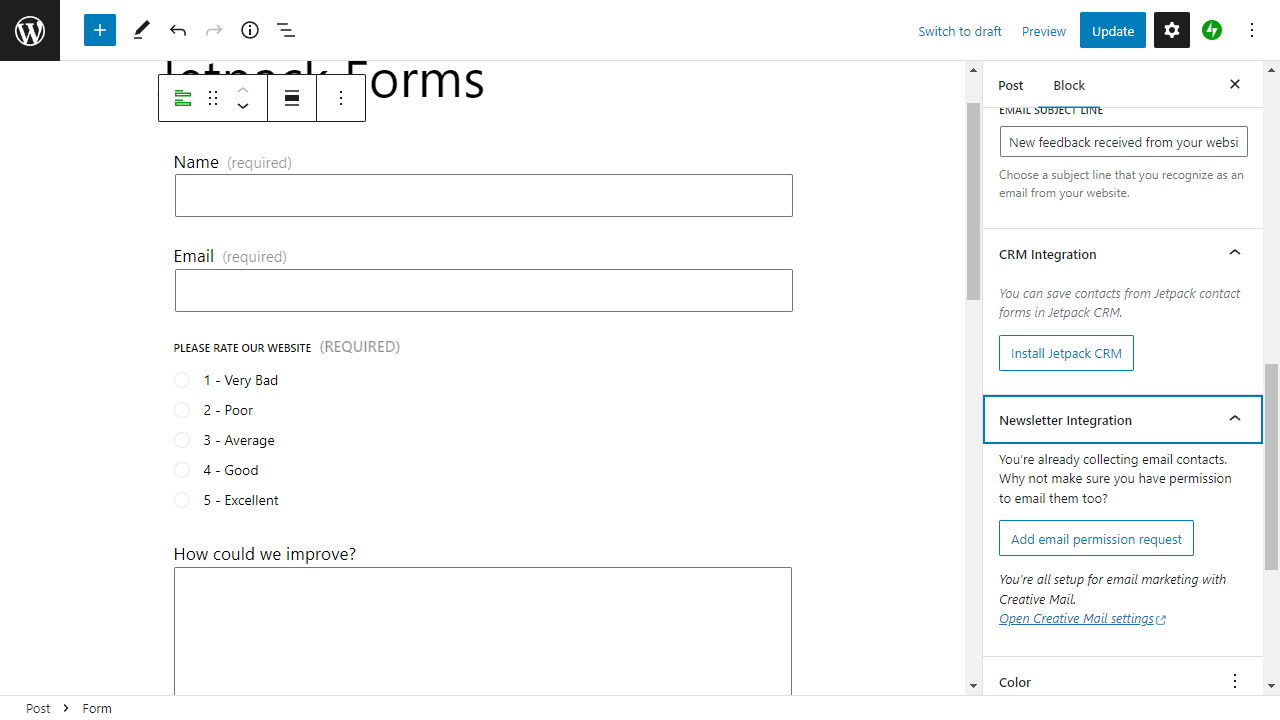
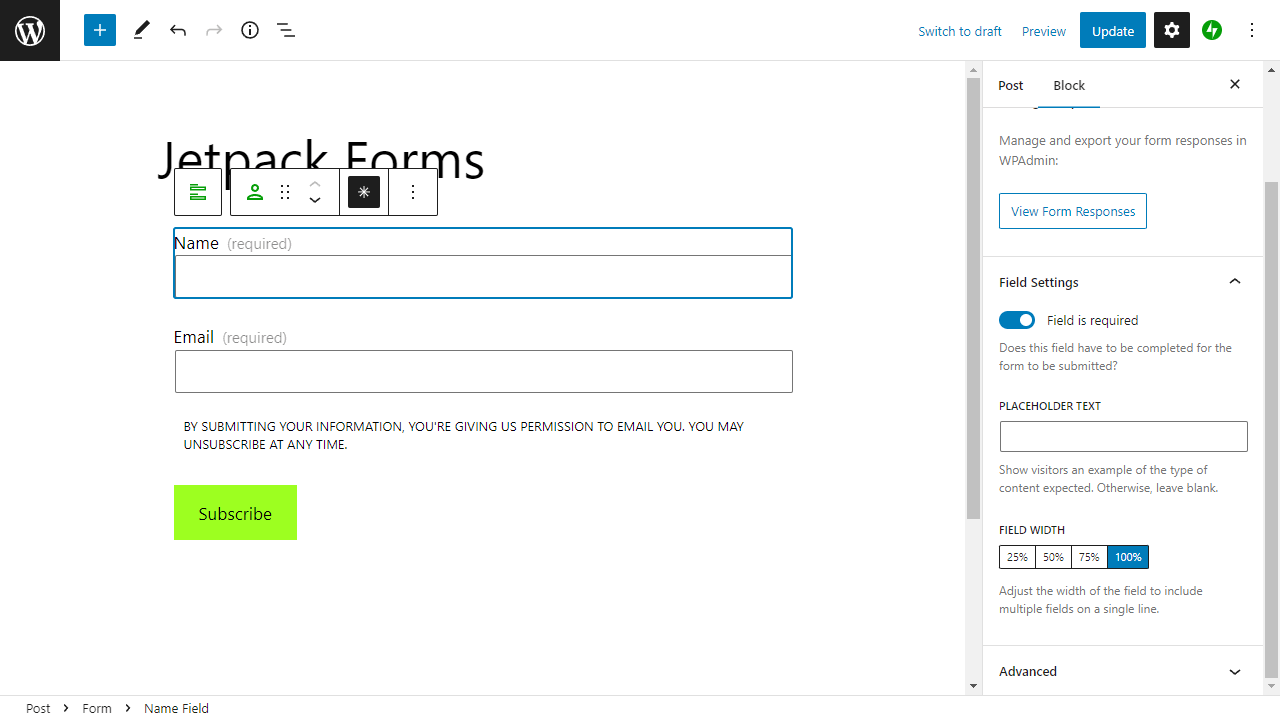
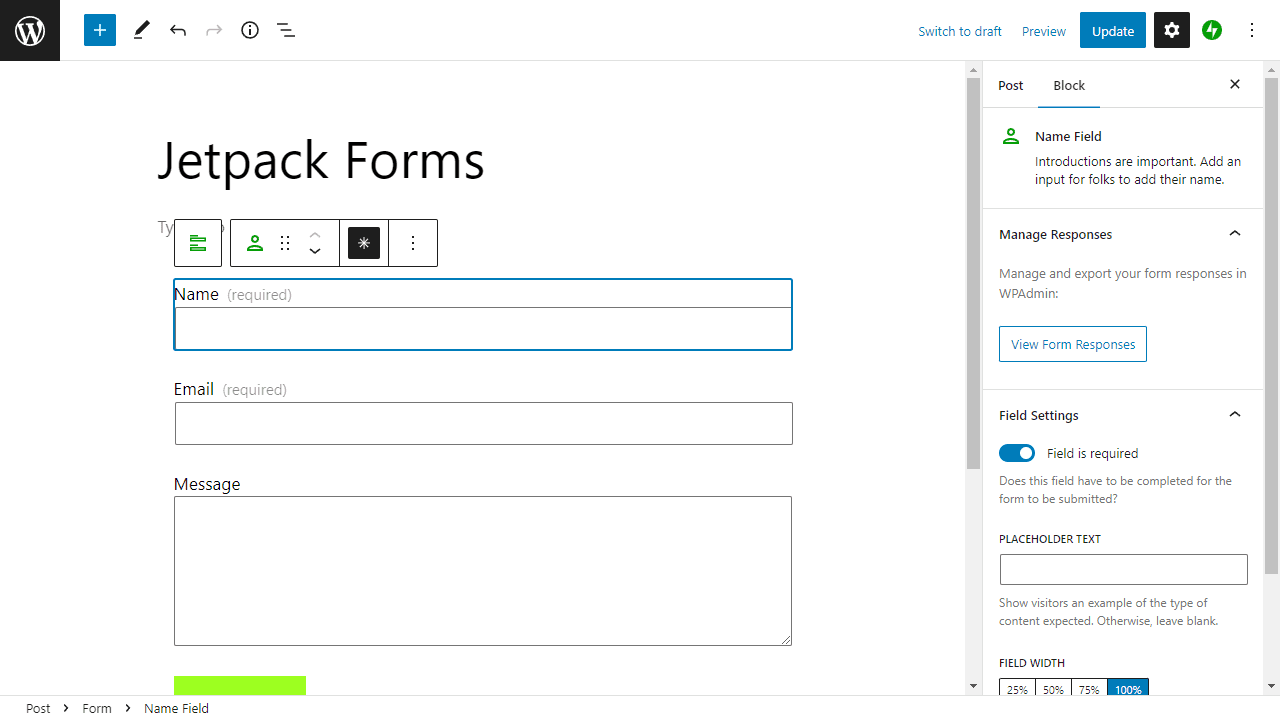
Advantages
- Fast and easy to use, thanks to Jetpack
- Can be used natively in the WordPress block editor
Disadvantages
- No great extensibility options
11. Contact Form 7
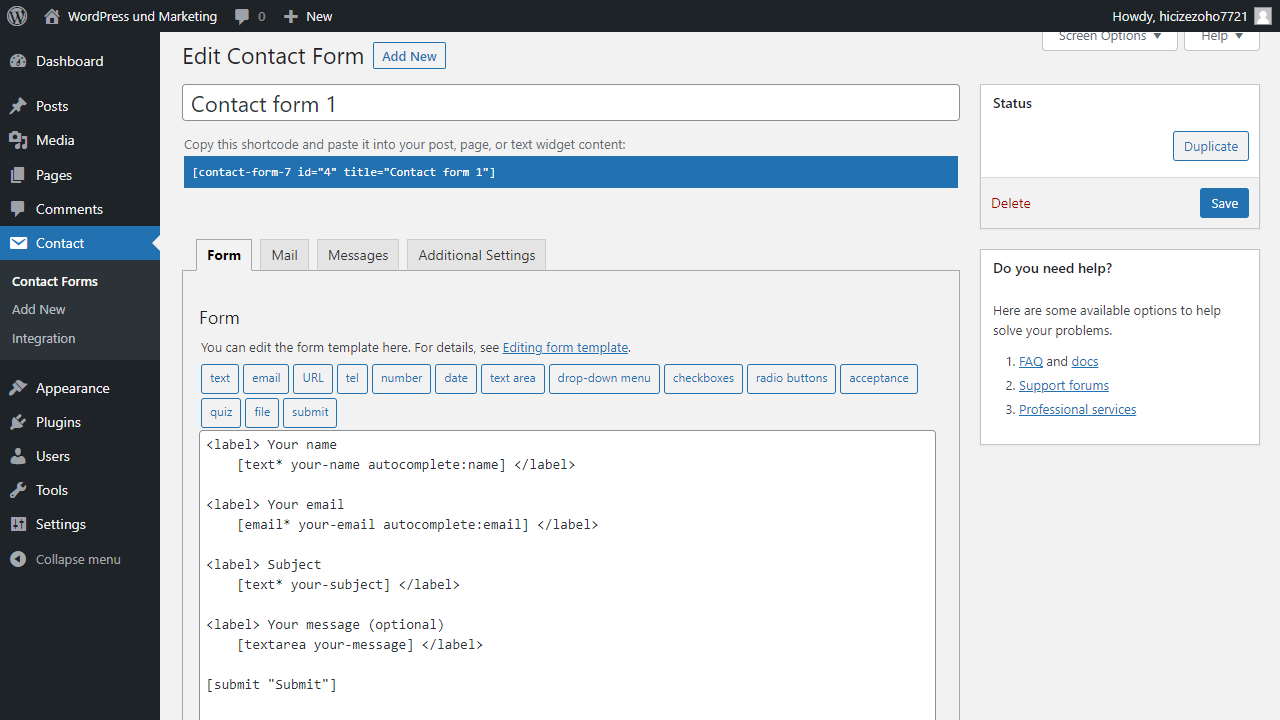
There is probably hardly a more well-known form plugin for WordPress than Contact Form 7. This is partly due to the fact that the extension has been available for ages and was one of the first of its kind. Even more so, Contact Form 7 is really good at what it tries to do. The plugin is activated on over five million blogs for a reason. Same also has to do with the fact that the WordPress form plugin is available for free. Better yet, there are even Contact Form 7 extensions available from third-party developers and many premium themes already have styles and features integrated for Contact Form 7. In short, the extension has established itself as a kind of standard for forms within WordPress and has also built up a lot of trust due to its long support. It has simply been working for many years.
Furthermore, Contact Form 7 is arguably one of the most beginner-friendly form plugins for WordPress. Once installed, there’s a default form right out of the box that’s a breeze to integrate. So you really don’t need any prior knowledge or experience here. If you want more, you can easily learn how to create a quiz or upload forms, for example, thanks to excellent documentation. What modern users will miss is a drag-and-drop interface like the Page-Builders or other form plugins presented here. Contact Form 7 is a bit old-fashioned in this respect, but it is solid and well supported. It’s up to everyone to decide what they prefer in the end.
Advantages
- Works directly after installation with a standard form
- If you want, you can also create more complex forms
Disadvantages
- No drag & drop form builder, instead a lot of classic manual work is required
- CSS and HTML knowledge should be present, in order to adapt own forms accordingly.
12. FormCraft
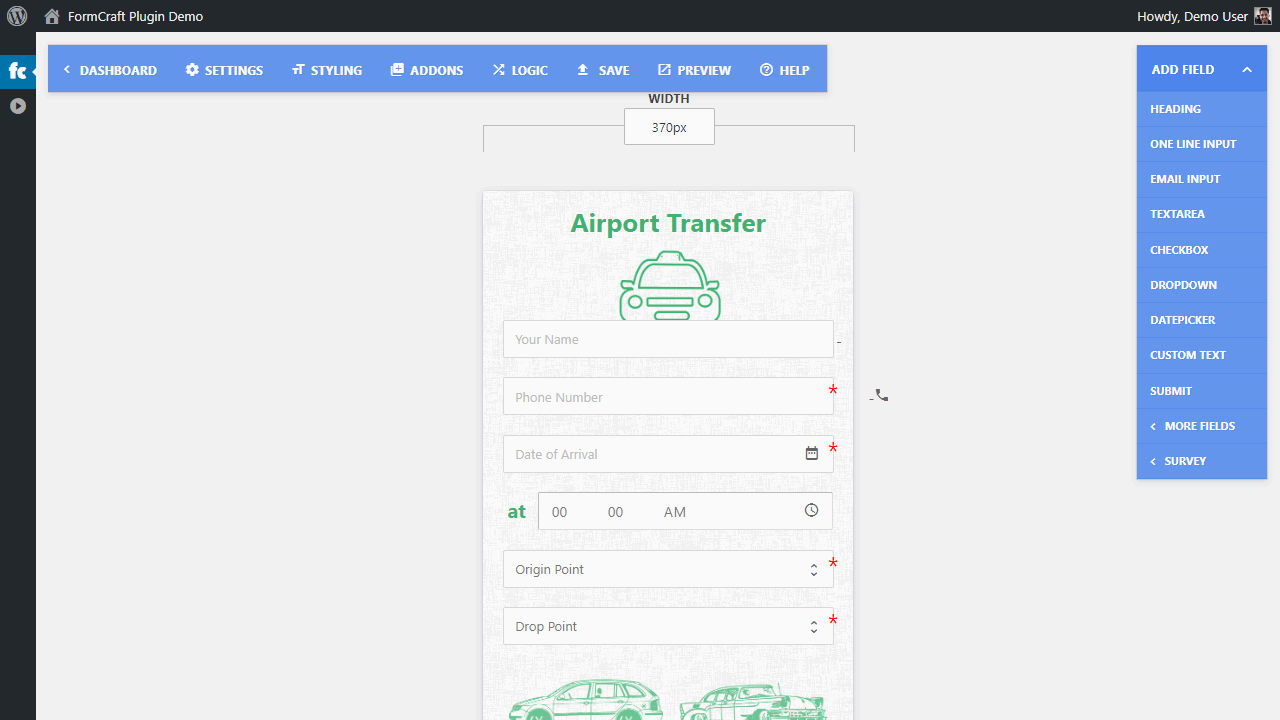
FormCraft is another drag-and-drop form builder for WordPress, with which you can very easily and quickly create the most diverse forms for your website. For this purpose, FormCraft has integrated various templates that make it especially easy to get started. So you either start completely by yourself or build a new form based on an already created template. I find the form builder particularly pleasant because it responds quickly, doesn’t look cluttered, and is easy to use. This is of course a subjective statement, but I really like it the best in direct comparison with similar WordPress form plugins.
For the plugin itself, as usual, there are some addons to integrate existing service. Some of these addons are available for free, the others cost around $20. By the way, this also works directly from the WordPress dashboard, since all addons are already displayed here. Checkouts or self-created calculators are also possible. All in all, a tidy and cleanly programmed plugin with strikingly good performance. In addition, the WordPress form plugin is initially available as a one-time purchase through Envato. All very fair, well thought out, super to use and therefore a clear recommendation.
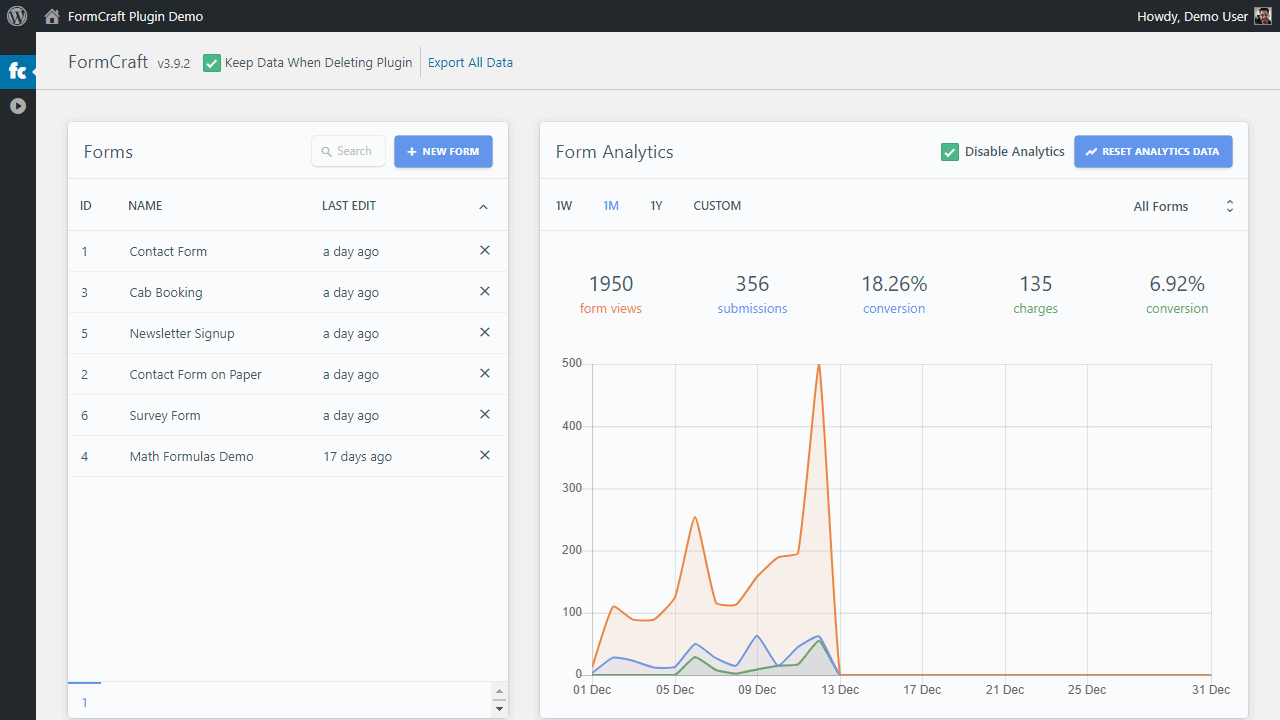
Advantages
- Free, already good and easy to use
- Particularly performant and easy to use
- Addon system with individual extensions is well thought out and pleasantly solved
Disadvantages
- None known
13. NEX Forms
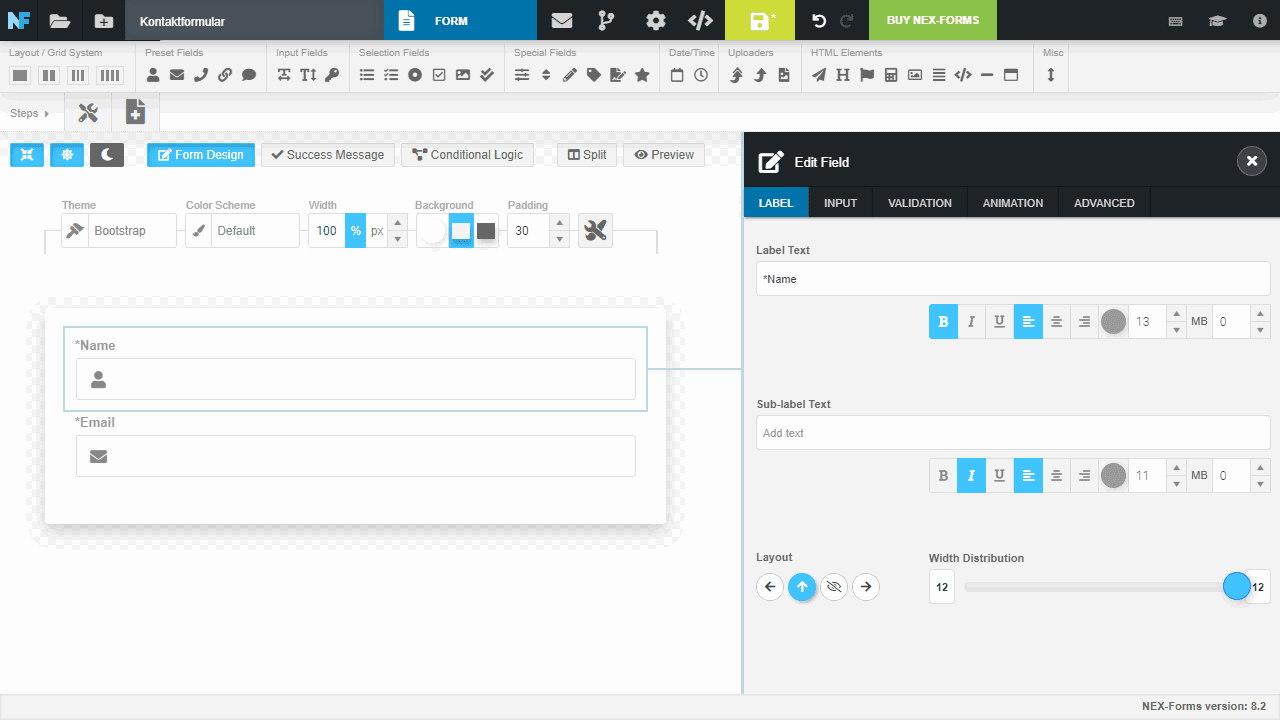
At the end I would like to introduce NEX-Forms. This may not be too well known and thus is less popular, but of course that doesn’t mean NEX-Forms is completely uninteresting. The rather small plugin is in fact not so small, at least when I look at the features. However, the forms are put together in a somewhat unusual way. The whole thing looks almost like a kind of Photoshop, with the tiled background.
Finally, the editor of NEX-Forms is mighty and extensive, but therefore anything but simple or easy to use. It is a bit fiddly and requires getting used to before custom forms can be created. Entries are all saved for it and uploads like analytics are also already included. Addons cost 20 US dollars, but are currently probably all completely free to get. For me, NEX-Forms is one of those WordPress form plugins that want too much and therefore do nothing really perfect. Everything is included, but almost every extension from our list works more catchy than NEX-Forms.
Advantages
- Low price and many features are already included
- The addons are currently available as a free download
- Regular updates visible
Disadvantages
- Seems to be implemented a bit loveless and is also unnecessarily complex
14. Thrive Leads
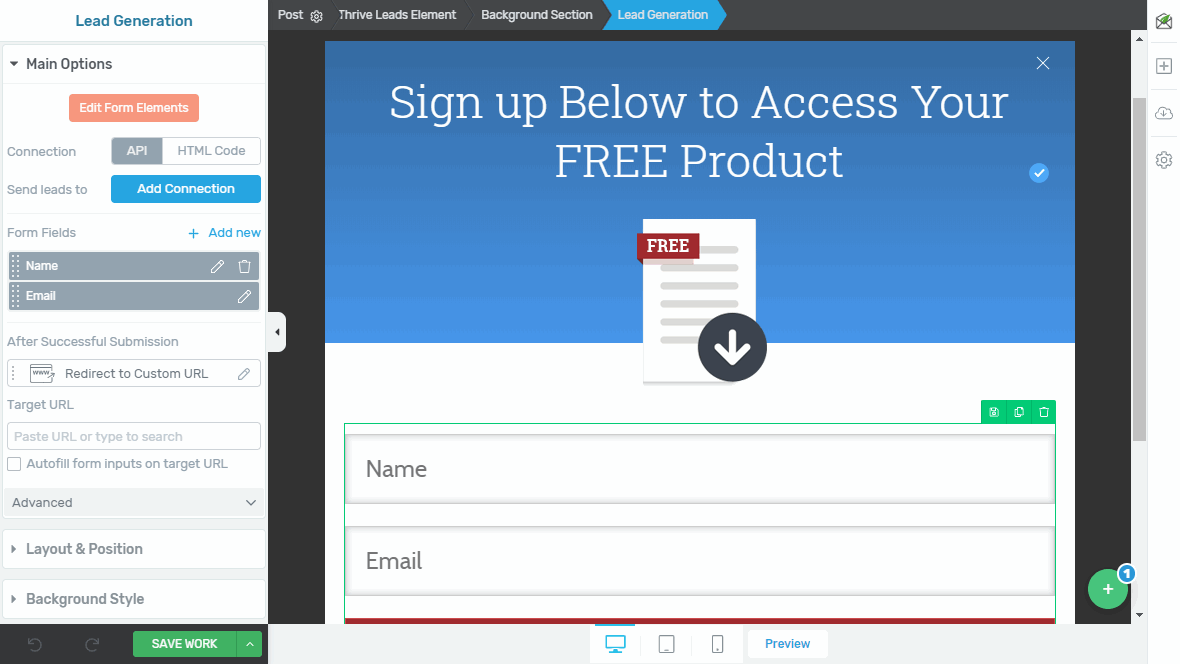
I almost forgot about Thrive Leads. The plugin is a lead engine, similar to FluentCRM. The main focus is more on newsletter leads than contact forms.
Advantages
- If you have a Thrive membership, you get the leads plugin for free.
Disadvantages
- Not necessarily the slimmest solution.
15. Bonus: Kadence Blocks Form
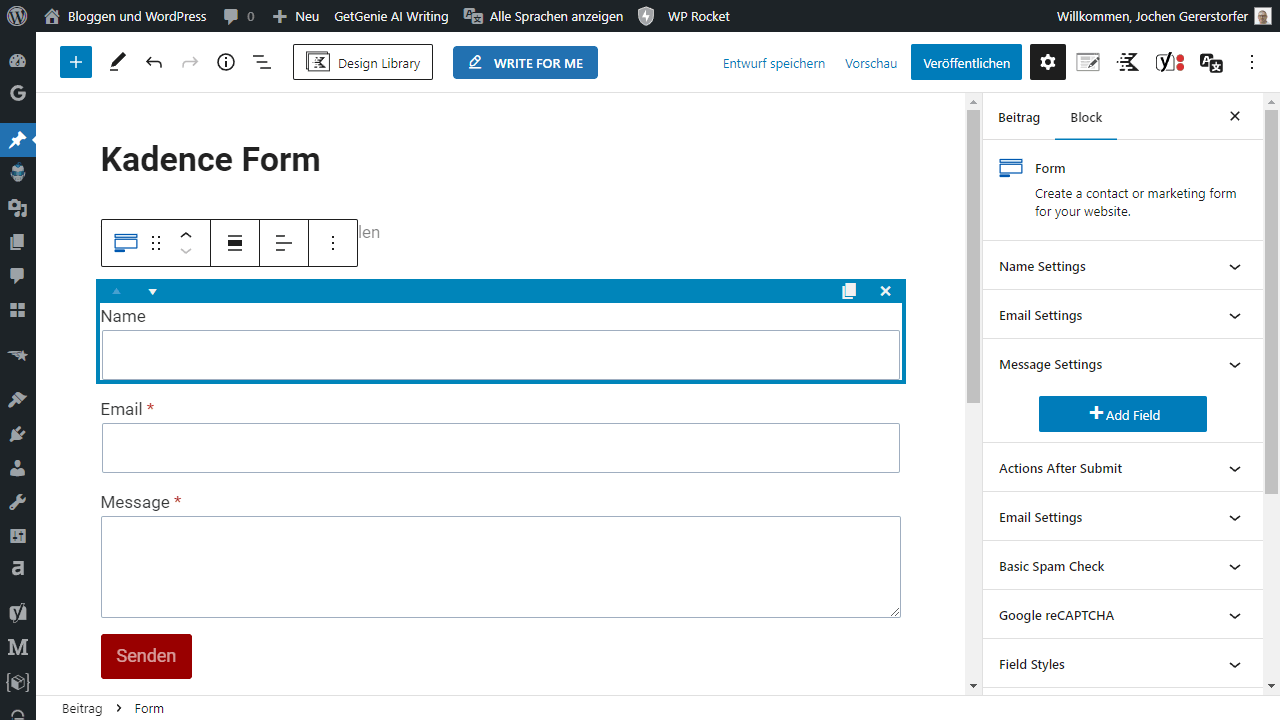
As good and extensive as the presented form plugins are. Most of the time I just need a quick form, without a lot of bells and whistles.
That’s exactly where the Form Block of the Kadence Blocks collection comes in handy. Of course, always in tandem with my favorite Kadence theme.
It even integrates with the following mailers:
If your service is not included, just use WebHooks.
No shortcodes are needed, you create and edit the form directly in the Gutenberg editor.
Advantages
- Very fast form
- No need to install an additional plugin if Kadence Blocks is used
- Integrations for the most important newsletter services
Disadvantages
- No elaborate editor
WordPress form plugin vs. form builder
When you decide to use a WordPress form plugin, you first need to ask yourself an important question. Do you just want to create a simple contact form or do you plan to offer extensive forms of various kinds? Do you possibly even want to provide a quiz or an upload form for your users? Depending on the task, different extensions should be used.
For ordinary forms I recommend a rather simple WordPress form plugin. For everything else, however, you’ll need one of the WordPress Form Builder plugins. These are a bit more extensive and basically something like a Page-Builder, just for forms. So just like you can create pages with Elementor or Divi, the form builder plugin will help you create appropriate forms.
If you have answered this question for yourself, you only have to choose one of the many available plugins. Because no matter if it should be just a form plugin for WordPress, there are quite a lot of them. The features of the form builders, however, differ only slightly from each other. So think beforehand, on which points you attach particular importance to forms. Your choice should then also be based on this, because almost all extensions now master the standards.
Contact forms and the DSGVO
For the General Data Protection Regulation (GDPR), however, the contact form poses a challenge. While common sense might assume that a visitor who provides their data and sends it to you so that you can contact them already knows all that, that’s not the case. So users who want to write to you must first agree to the respective privacy policy.
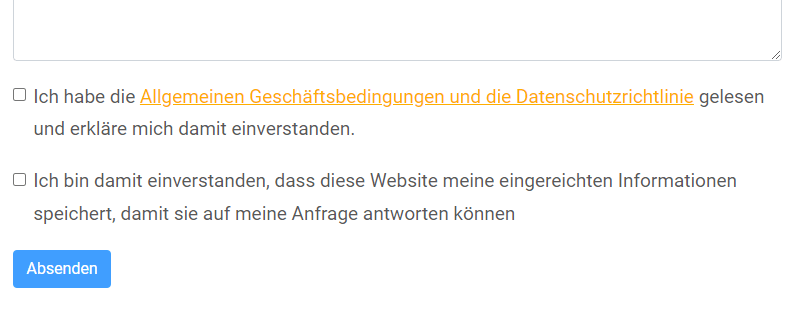
This requires a checkbox in the form, which must not be selected by default because that would be like an opt-out. The user must therefore actively confirm the checkbox (opt-in) to agree to the privacy policy linked there. This privacy policy is an integral part of your website and must include a section on how to contact you.
By the way, this also applies to any systems concerning spam protection. ReCaptcha from Google may be problematic and is not a privacy-friendly solution. At least not if you want to make sure there won’t be any trouble later on. So make sure that you include a privacy notice in the contact form.
Choose what you really need
In the end, the main thing is to choose only what you actually need. The many WordPress form plugins make it very easy for you to use an extension that is simply too much of a good thing. If a plugin has a lot of features, this is always first perceived as positive, but it can also be the other way around.
The simpler and more minimal an extension for WordPress is, the less ballast it brings. If the developer has done everything right, it will run more performant and pose less risk for security vulnerabilities. A WordPress form plugin should ideally have only the features you really need or want to use in the future.
My selection should have helped you to choose an exactly fitting form plugin for WordPress. I have also picked out my three favorites at the top. Whatever choice you make is up to you in the end. But please be careful not to be too impressed by features, and think more about what you really need for your blog. Good luck with it and good luck.






